
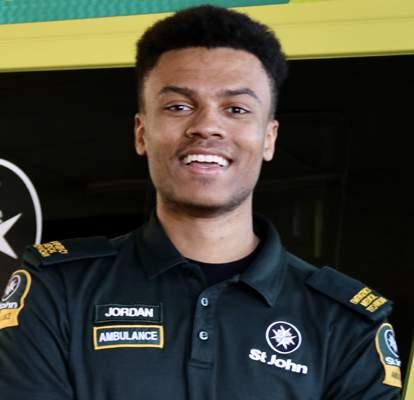

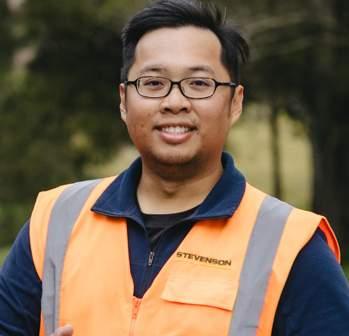
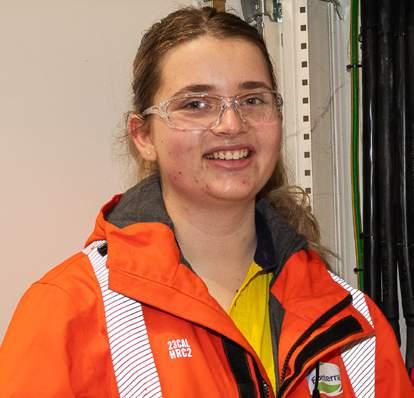
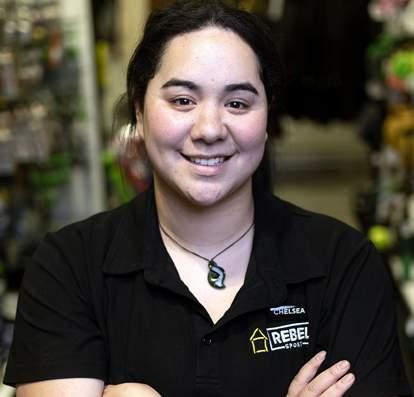
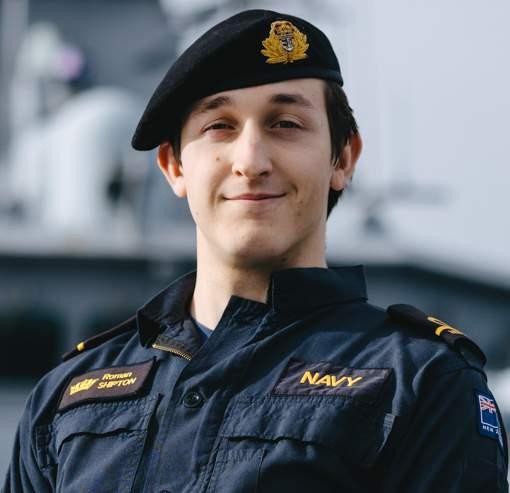
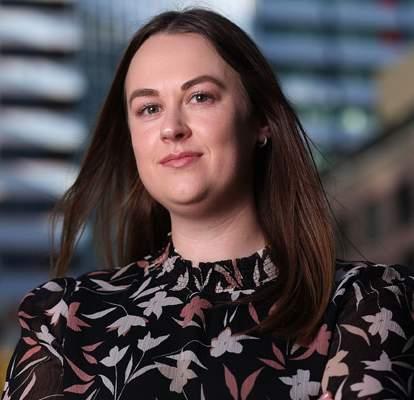




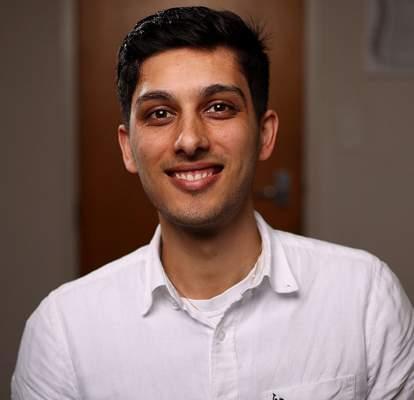
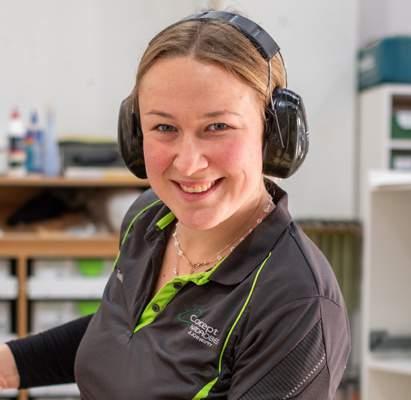
LEAVINGSCHOOLNZ WWW.LEAVINGSCHOOL.CO.NZ JORDAN TAVARES EMERGENCY MEDICAL TECHNICIAN – PAGE 12 APRIL STONE ACCOUNTING TECHNICIAN – PAGE 7 ROMAN SHIPTON ROYAL NEW ZEALAND NAVY – PAGE 10 CHELSEA PULLEN RETAIL MANAGER – PAGE 14 TANITA
JOINER –
17 July 2023 | ISSUE # 27 A free guide to study and career options for high school students Years 12-13 ZANE YEE INDUSTRIAL ENGINEER – PAGE 22 KENDYLL BLISSETT ELECTRICIAN – PAGE 18 DION ABAYAKOON CHIROPRACTOR – PAGE 28 ETHAN BREINHORST DOCTOR – PAGE 35
GARNETT
PAGE

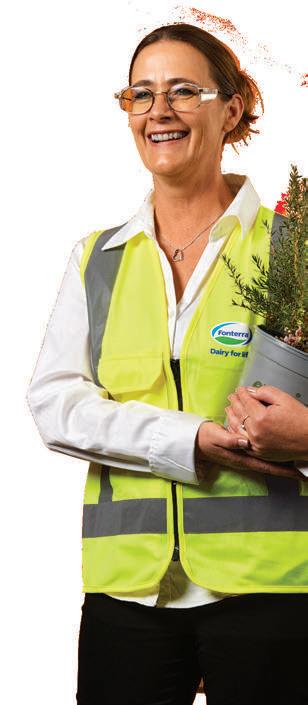
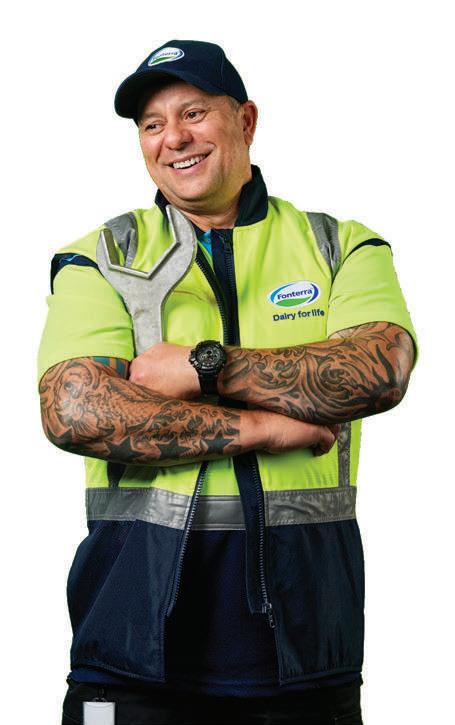
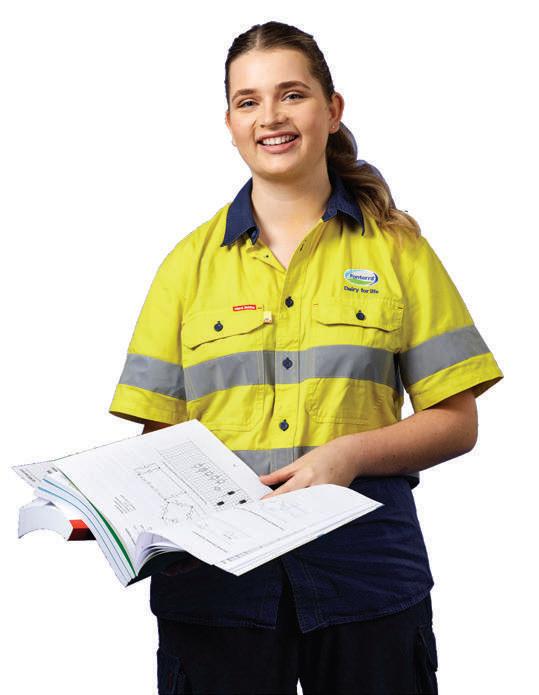
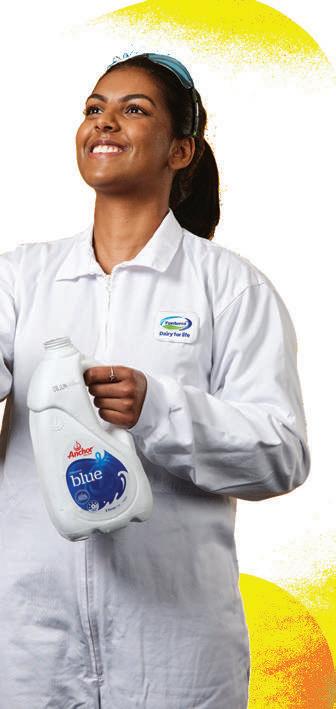
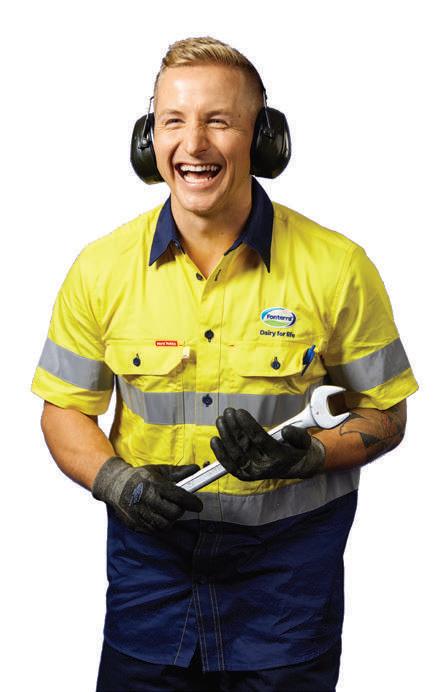
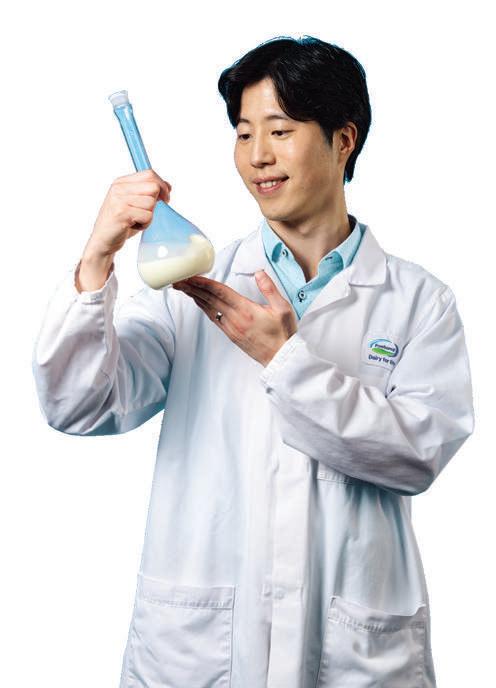
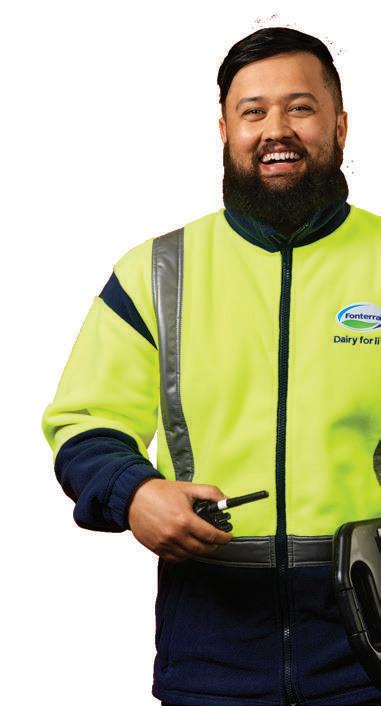

MANAGING EDITOR
Oliver Lee
SUB-EDITOR
Elise McDowell
CONTRIBUTING WRITERS
Milo Brown, Diana Clement, Rt Hon Chris Hipkins, StudyLink, Fiona Terry, Peter White
PHOTOGRAPHERS
Lieutenant Nathan Atkinson, Tim Cuff, Sandra Henderson, iStock, Luke Marshall, Paula McInnes, Marty Melville, Dean Norrie, Corporal Sean Spivey, Alan Stevens, Logan West, Ben White
DESIGN & LAYOUT
Mervyn Hurley
HNZL 2014 Limited
PRINTER Webstar, Auckland
PUBLISHER



Box 331-667, Takapuna, Auckland 0740
T: +64-9-486 6966
E: oliver@oliverlee.co.nz
W: oliverlee.co.nz
W: LEAVINGSCHOOL.CO.NZ
ISSN 2463-3380 (Print)
ISSN 2463-3399 (Online)

COPYRIGHT: Reproduction in whole or in part by any means is prohibited. DISCLAIMER: The opinions expressed in this magazine do not necessarily reflect the opinions of the publisher. Although all material is checked for accuracy, no liability is assumed by the publisher for any loss due to use of material in this magazine.

05 FOREWORD | RT HON CHRIS HIPKINS, PRIME MINISTER
The Prime Minister’s reflections on his time in school and at university.
07 ACCOUNTING TECHNICIAN | APRIL STONE
It might be surprising to know that maths is not key to the day-to-day tasks of this qualified accounting technician.
08 AUDITOR | JAMIE MARSHALL
A helpful and friendly work environment where the team is always the focus makes this auditor happy.
09 LAWYER | RACHAEL CHOY
This senior lawyer has found meaningful and satisfying work.
10 ROYAL NEW ZEALAND NAVY | ROMAN SHIPTON
Scholarship scheme provides opportunities and qualifications for this trainee Weapons Engineering Officer.
11 ROYAL NEW ZEALAND NAVY | ASHLEY UJDUR
A neat pathway where business and naval aspirations merge and a scholarship scheme is covering it all.
12 EMERGENCY MEDICAL TECHNICIAN | JORDAN TAVERES
Being empathetic and an accurate problem solver are key attributes required to work in paramedicine
13 EARLY CHILDHOOD STUDIES | ELENÉ HEYSTEK
From a young age, it was clear that a career with children was the right pathway and that has turned out to be true.
14 RETAIL MANAGER | CHELSEA PULLEN
Grow a great career and foster a great team in retail management.
17 JOINER | TANITA GARNETT
Apprentice balances enjoyable joinery career with provincial rugby.
18 ELECTRICIAN | KENDYLL BLISSETT
Confident in her decision, this go-getter is charging ahead to complete an electrical apprenticeship.
19 ENERGY CENTRE TRAINEE | EDDIE CRAIG


Be provided with plentiful opportunities, learn great skills and be paid to learn, just like this trainee at Fonterra.
20 ELECTRICIAN | NICOLA VAN DER WESTHUIZEN
Lighting the pathway ahead for future female tradies, be inspired by this electrical apprentice.
22 INDUSTRIAL ENGINEER | ZANE YEE
Work in the aggregate and quarry industry and get to use some cool technology.
23 COLLISION REPAIR TECHNICIAN | BAILEY JACKSON

It is effort and self-belief that will really drive you forward, as this award-winning apprentice shows.
THEMOSTOPENDAY
Key dates, websites and information are all collated in one spot
ROAN TAYLOR
Following in his parents’ footsteps, this deckhand has experienced positives at every turn since starting his career at sea.
GEORGIA STEVENSON
Take the leap and get on board with building a sustainable future and participating in exciting projects.
DION ABAYAKOON
Get to grips with the body’s communication highway and how it
HEAVY AUTOMOTIVE ENGINEER | JORDAN SPAIN
An apprenticeship at Komatsu working on big machinery has been just the ticket for this Kiwi footballer.
|
RICHARD LEE
Starting his career through their graduate programme, this commerce graduate has gone on to find his niche at Countdown.
CHARLOTTE LEABOURN
Have you ever considered if dentistry is a career that you could really sink your teeth into?
ETHAN BREINHORST
A passion for medicine has seen this house officer through university
ROYAL NEW ZEALAND NAVY | JESSICA LAYBURN
Scholarship recipient describes her Naval experience as amazing. NEWTON COOK
Apprentices in the hair industry are offered opportunities galore.
SEBASTIAN SEKENE
An Outward Bound course, taking responsibility and showing maturity led to this apprentice securing scholarship awards
REGISTERNOW aut.ac.nz/liveExploreyouruniversity studyoptions
AUG2023AUTCITYCAMPUS

CONTENTS
3
26
LEAVING SCHOOL issue #27 39 STUDYLINK An overview of what you need to know about StudyLink. 41 TECH ENTREPRENEUR | MYLES FOSTER A career in computers was the focus and the result is a tech entrepreneur running his own business. 42 FINANCIAL TIPS | Discover how to avoid unnecessary spending. 43 GENERAL ELECTION | Your voice matters on 14 October. 44 FINANCIAL TIPS | Learn to manage your bank accounts better. 45 INTERVIEW TIPS | Here’s what you need to know to impress. 46 JOBS IN FOCUS | You might just find your future career.




AVAILABLE FREE ONLINE www.leavingschool.co.nz Scan me with your smartphone
OF THE PRIME MINISTER
TAKE ALL OPPORTUNITIES
by RT HON CHRIS HIPKINS, PRIME MINISTER OF NEW ZEALAND //
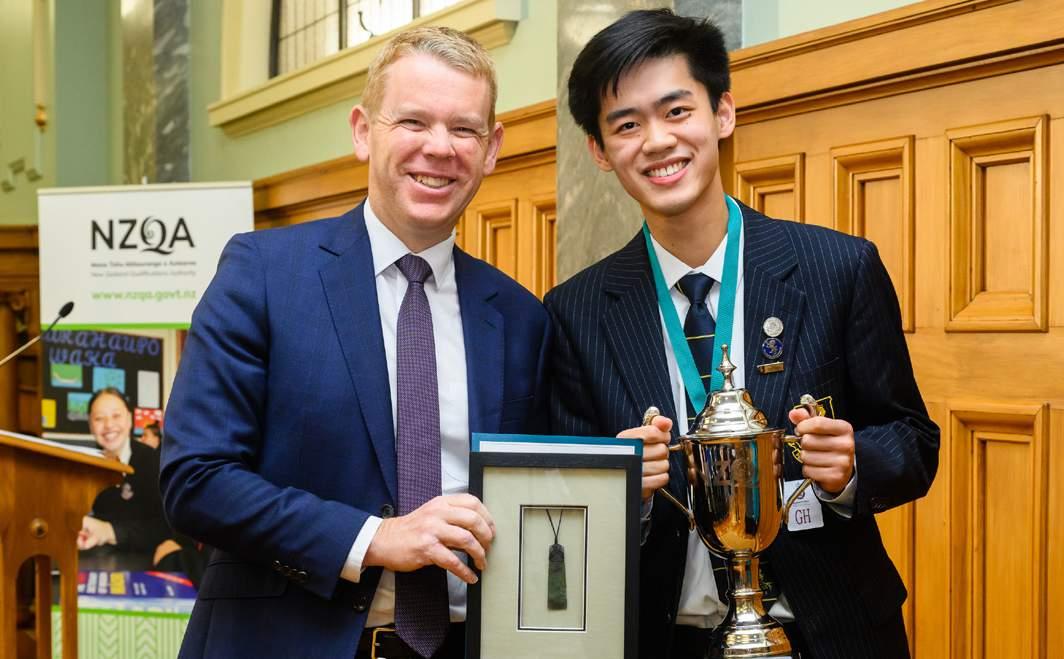

WHEN I WAS AT SCHOOL, I WANTED TO BE A VET AND THEN AN ELECTRICIAN BUT SOMEHOW, I ENDED UP BEING PRIME MINISTER!
I went to Waterloo Primary School and Hutt Valley Memorial College, which is now Petone College. I had a wonderful time at school. Although I wasn’t always the best student I enjoyed being there, had some great teachers and good mates. I was lucky to be able to walk to school in Lower Hutt and play on the vast green fields and in the surrounding bush. I got interested in cycling and it’s something I still do today.

History was my favourite subject and I remember wondering why we were learning about other countries’ history, but not our own. I’m proud to say we’ve changed that so New Zealand history will be taught in schools – it’s only right that we all learn about ourselves and how we got to where we are, so we can make positive changes for the future.
It was my days at Victoria University where I became interested in politics. University is a great place to learn and explore and figure out what you’re into.
I got involved with the student association and various causes – like scrapping interest on student loans to make life a bit easier for students.
Since then, it’s become even tougher with high rental prices and the cost of living. But I am proud to be part of a Government that has increased student allowances and student loan limits by $75 a week and put healthy homes standards in place, so that rental properties have to be drier, warmer and generally better to live in.

While I chose to go to university when I left school, I know it’s not for everyone. I’m incredibly passionate

training options through school and beyond, and is the reason we are making sure regional education through Te Pūkenga is viable well into the future.
My advice to school leavers is when opportunities come up, take them. You might feel like you aren’t good enough or aren’t up to the task, but you’ll learn a lot regardless. You might find you really enjoy it.
I had a call like that recently. A friend of mine, Jacinda, rang me to talk about her plans for the future with a suggestion I might be asked by the team to take on the job of Prime Minister. It was definitely one of those moments where I had lots of feelings about whether I’d be up to the task. But you’ve got to take those opportunities, and I’m so glad I took this one about the trades and making sure there are pathways for further education or training for everyone to go on to.
That’s part of the reason our Government has funded the Apprenticeship Boost to help employers keep apprentices on through COVID-19, are planning to make that permanent, are better funding trades
Rt Hon Chris Hipkins Prime Minister of New Zealand
LEAVING SCHOOL ISSUE #27 | LEAVINGSCHOOL.CO.NZ
REFLECTIONS
5
Rt Hon Chris Hipkins presents the Prime Minister’s Award for Academic Excellence to Michael Yao, formerly of Auckland Grammar School.
A FRIEND OF MINE , jacinda , RANG ME TO TALK ABOUT HER PLANS FOR THE FUTURE WITH A SUGGESTION I MIGHT BE ASKED BY THE TEAM TO TAKE ON THE JOB OF PRIME MINISTER
RT HON CHRIS HIPKINS
Introducing the new AT Program
Zingara MacDougall Assistant Accountant at Ryman Healthcare
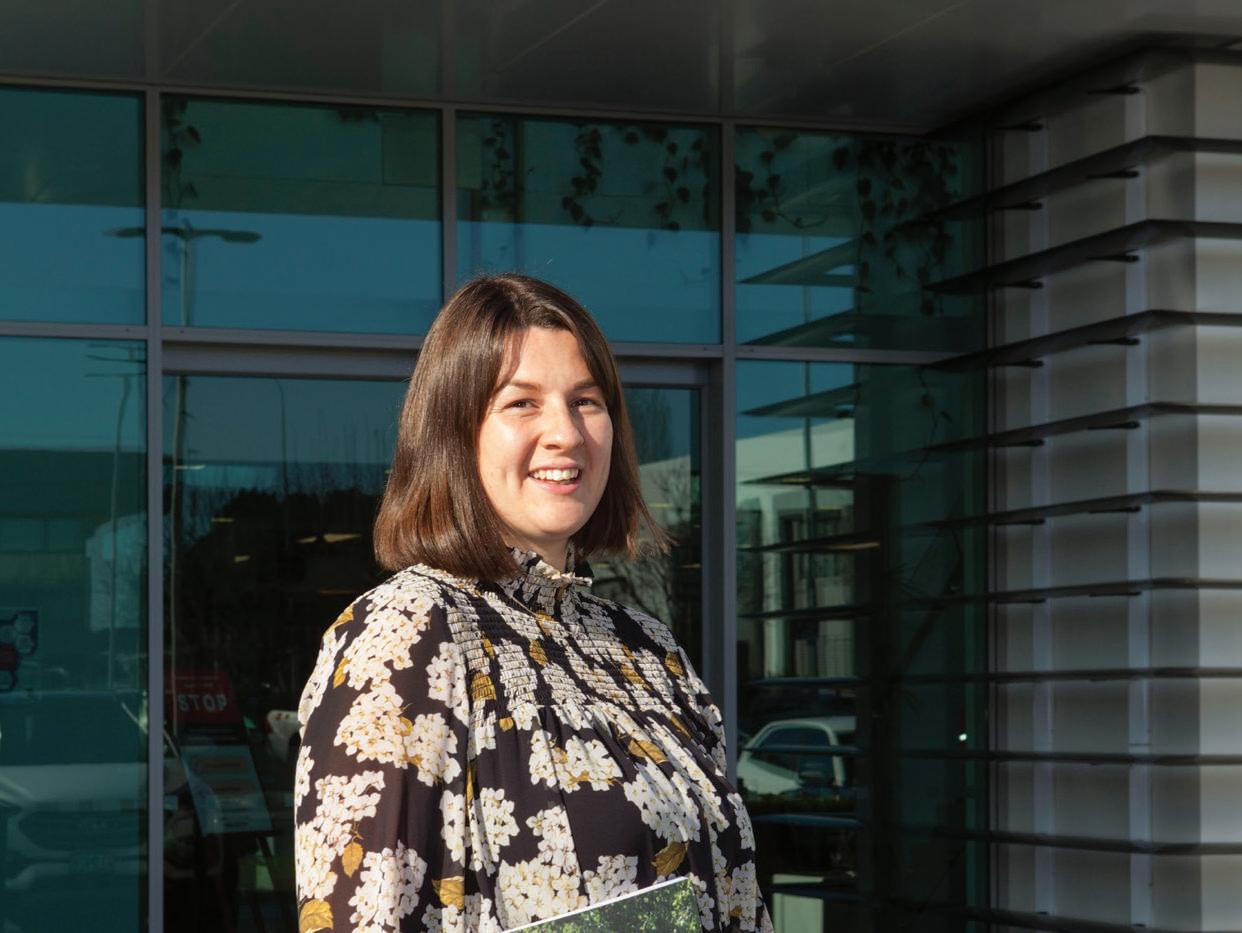
The world of accounting is changing faster than ever before with transformational new trends and digital advances.
The new Accounting Technician (AT) Program has been designed to use real scenario-based learning with a focus on the technical and professional skillset that you will need to get ahead in your career.
The AT designation is a practical choice for those who aspire to work in the accounting and finance industry. You will be trained to oversee and manage financial accounts to ethical and professional standards with improved ongoing support and professional development opportunities.
What benefits come with the new AT Program?
• Flexible entry pathways to ensure candidates with different backgrounds can access training and develop their skills.

• Practical, on the job learning to enable ATs to be work ready on completion of the program.
• CA ANZ approved, research-based content and capability model with an ethics standard that aligns with the CA Program.
• A streamlined and efficient online course enrolment process.
Take charge of your future, learn more about the AT program today.
© Chartered Accountants Australia and New Zealand. 2023. ABN 50 084 642 571. All rights reserved.
New
caanz.com/AT-Program
New pathways. New course.
competency framework
PROBLEM-SOLVING WHIZ QUALIFIED ACCOUNTING TECHNICIAN
writer PETER WHITE // photographer MARTY MELVILLE
“The funny thing is I’m terrible at maths and there is a perception you need to be good at maths to be an accountant,” says APRIL STONE . “But I really like that it is actually more about that strong, analytical and problem solving, attention-to-detail aspect of it.”
April (27) is the financial systems team lead at Public Trust in Wellington but describes herself as a systems accountant, which is a blend of IT and accounting.
“I look to improve business processes, optimise the accounting system and implement financial controls to mitigate risk and increase efficiencies.
“I bring a unique blend of accounting and IT expertise to the table. We look after the financial system that Public Trust uses. I’m passionate about using technology to drive business success.

“That blend of IT and accounting means no two days are the same. My team is a help desk. If one of our Trustees at Public Trust decides they are having some problems with the financial system, they can come through to our team and we provide support.
“I am involved in a lot of change like when the recent trust tax legislative changes occurred, we had to work out how does it work in the system.”

April recently became a Chartered Accountants Australia New Zealand (CAANZ) qualified accounting technician, which allows her to have her experience recognised and shows potential employers they can have confidence in her skills and experience.

At Wellington East Girls’ College, April took PE, Religious Studies, two Biology classes and Tourism and English in Year 13. She was not sure what she wanted to do after leaving school, so took a gap year.
“I was working at the local New World part-time and went fulltime once I left school. I had the opportunity to assist with some of the office functions, which then led to a fulltime office administration position. Working in a small office environment, I got exposure to all aspects – including bank reconciliation, payroll, accounts payable/receivable, month-end processing and gross profit calculations.
CHARTERED ACCOUNTANTS ANZ STUDENT AFFILIATE




Explore the accounting and finance world and receive valuable information and resources to broaden your skills and understanding. You will be invited to networking and careers events and have access to exclusive employment opportunities. What are you waiting for? Sign up to be a Chartered Accountants ANZ student affiliate today.
“I was very fortunate that the owner of the New World recognised my attitude and eagerness to learn so provided me with the opportunity to study with the Open Polytechnic to re-enforce the skills I was learning on-the-job.
“I soon realised that I wanted to be doing what our accountants were doing so I moved to BDO as an assistant accountant before progressing to [an] accountant role. I didn’t have a degree but that
didn’t stop me from getting a job at one of the world’s top accounting firms.”

The key advice April has for school leavers – you don’t have to have the typical student experience but having the right attitude and eagerness to learn will take you far.
“Grab any opportunities that come your way with both hands and always allow yourself to be open to learning new things.”
STONE
i DIDN ’T HAVE A DEGREE BUT THAT DIDN ’T STOP ME FROM GETTING A JOB AT one of the world’S TOP ACCOUNTING firmS.
APRIL
LEAVING SCHOOL ISSUE #27 | LEAVINGSCHOOL.CO.NZ ACCOUNTANTS AUSTRALIA NEW ZEALAND ACCREDITED DEGREE ACCOUNTING TECHNICIAN 7
COLLEGIAL AND FRIENDLY
“Being a team player within a team environment is what I like most about being an auditor” says JAMIE MARSHALL.
“The majority of the work I do is team-orientated and you have to know how to interact with people at different levels to achieve a common goal.”
Since moving from the Waikato, where he grew up and went to university, Jamie (22) has established himself with one of the world’s largest accountancy companies. He is an auditor with KPMG and is based in Auckland’s CBD.
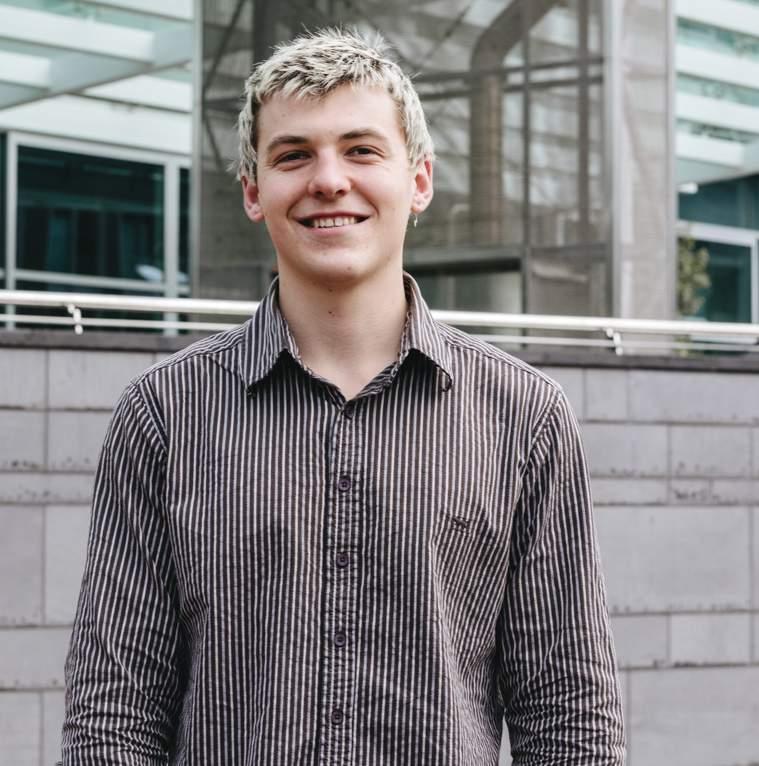
“It is about working as a team and there is always someone above you that you can ask questions to. You cover quite a lot of the business processes in auditing.

“There are always people you can talk to if you are ever lost. Everyone is happy to help and [this is] one of the main reasons I enjoy it.”
Jamie is currently completing the Chartered Accountants (CA) Program and is working towards the Graduate Diploma in Chartered Accounting.
Before joining KPMG, Jamie spent a year as a student representative with Chartered Accountants Australia and New Zealand.
“It was a good way to get involved more and get your name out there. It is always good to talk to other students about Chartered Accountants. There were a few events I attended, and we were at the forefront of telling people about all the accounting jobs out there.”
Jamie went to the University of Waikato and graduated with a Bachelor of Business Studies.
“The university has an amazing business school. It is not a huge place so you get lots of exposure to things you may not get in a bigger city like Auckland or Wellington. It is more concentrated with the number of students.
“Yes, I loved it. There were a lot of good professors there and it is a really good environment actually.”
Before heading to university, he attended Matamata College in the Waikato, not far from Hamilton. In Year 13, he took Accounting, Calculus, PE, Physics and Chemistry. He says he did look at the possibility of going away to study at other universities but in the end, he settled on staying close to home.
KEY FACTS
CHARTERED ACCOUNTANTS ANZ STUDENT AFFILIATE



Explore the accounting and finance world and receive valuable information and resources to broaden your skills and understanding. You will be invited to networking and careers events and have access to exclusive employment opportunities. What are you waiting for? Sign up to be a Chartered Accountants ANZ student affiliate today.
He also got a Ko Te Tangata scholarship, which is available to secondary school students who enrol at the University of Waikato and who received an excellence or merit endorsed NCEA Level 2.
“That kind of just spoke to me and it was close to home as well. I didn’t have to move away from family and a lot of my friends were going there.”
■ JAMIE MARSHALL CURRENTLY WORKS AS AN AUDITOR AT KPMG NEW ZEALAND
■ HE HAS A BACHELOR OF BUSINESS MAJORING IN ACCOUNTING FROM THE UNIVERSITY OF WAIKATO


■ JAMIE IS COMPLETING THE CHARTERED ACCOUNTANTS PROGRAM AND WORKING TOWARDS THE GRADUATE DIPLOMA IN CHARTERED ACCOUNTING
For school leavers considering a career in accountancy, Jamie says the key thing is to be confident and to back yourself.
“Some of my friends at uni were too scared to apply for a big firm. If you take a shot at it, you may be surprised. Even if you don’t have the best grades, a lot of the firms are looking for all-rounders and team players.
“Just never doubt yourself.”
For more information on careers in accounting, visit www.charteredaccountantsanz.com/ become-a-member/memberships/ student-affiliates/high-school
LEAVINGSCHOOL.CO.NZ | LEAVING SCHOOL ISSUE #27 AUDITOR 8
EXPERIENCE AUDITING writer PETER WHITE // photographer LOGAN WEST
EVEN IF YOU DON ’T HAVE THE BEST GRADES , A LOT of FIRMS ARE LOOKING FOR ALL-ROUNDERS AND TEAM PLAYERS.
JAMIE MARSHALL
MEANINGFULLY FOCUSED WORK
“I really love that I get to work with amazing clients and get to be a part of their journey,” says RACHAEL CHOY.
“Where I work, at a community law centre, we provide free legal advice for those parts of the community that might not otherwise have that legal help. That is really special and it is a real privilege to do this kind of work.”
Rachael is a Senior Lawyer with knowmore Legal Service, which is based in Melbourne. Her role is varied and interesting and one that gives her loads of personal satisfaction.
“A Senior Lawyer supplies more support to their team and is involved with supervising junior lawyers and more practice management. It has a slightly different focus, in addition to bringing about good results for your clients.”


The 29-year-old took Biology, Geography, Physics, English and Calculus in Year 13 at Onehunga High School in Auckland. She went to the University of Auckland and applied for different degrees as she was not really sure what she wanted to do.
“I started doing the BA/LLB conjoint but spent most of my time unsure where I wanted to go and what career I wanted. Getting into stage two law is harder than getting into stage one. I transferred my law degree over to Auckland University of Technology (AUT) where I was accepted into stage two.

“That was awesome for me as AUT was a smaller law school and there were lots more opportunities. I ended up doing honours and was able to get more involved in law student competitions and events.
“Doing my law degree at AUT better suited my learning style and I got to know lecturers and more people because we were a smaller group compared to other universities.”
Rachael has had an interesting mix of roles so far in her career before heading to her current position in Melbourne a year ago.
“I had a few different roles trying to figure out what I wanted to practice in as a lawyer. Initially, I went to commercial law because I thought that would be a safe thing to do and ended up finding my way to the New Zealand Royal Commission of Inquiry into Abuse in Care, which was a lot more [of a] meaningful focus for me.
“Now I am in Australia working in a similar space.” Moving to Melbourne was both a career choice and a chance to explore a new city full of arts and culture. Rachael says a law degree opens up a world of opportunities and not just in the standard career options that you would expect.
“I have many friends who have studied law and then decided to not practice law.



■ RACHAEL CHOY HAS A BACHELOR OF LAWS (HONOURS) FROM AUT
■ SHE WORKS AS A SENIOR LAWYER AT KNOWMORE LEGAL SERVICE, A COMMUNITY LAW CENTRE IN MELBOURNE, AUSTRALIA
■ RACHAEL STUDIED BIOLOGY, GEOGRAPHY, PHYSICS, ENGLISH AND CALCULUS IN YEAR 13 AT ONEHUNGA HIGH SCHOOL IN AUCKLAND
“The fact they have a law degree has really helped them to go on to lots of different career paths, including working within businesses and doing product management or marketing or policy, and some have dabbled in politics as well.”
Her advice to school leavers is to say yes to any opportunities that present themselves, even if you think you might not be good enough.
LEAVING SCHOOL ISSUE #27 | LEAVINGSCHOOL.CO.NZ
COMMUNITY LAW LAWYER 9
DOING MY LAW DEGREE AT AUT BETTER SUITED MY LEARNING STYLE AND I GOT TO KNOW LECTURERS AND more people because we were a smaller GROUP COMPARED TO OTHER UNIVERSITIES .
writer PETER WHITE // photographer BEN WHITE
RACHAEL CHOY
WATCH THE WORLD OPEN UP STELLAR NAVY SCHOLARHIP SCHEME

 writer PETER WHITE photographer LOGAN WEST
writer PETER WHITE photographer LOGAN WEST
Joining the Royal New Zealand Navy opens up lifelong career opportunities, the chance to travel the world and to gain university qualifications without paying fees. ROMAN SHIPTON is one of the young New Zealanders taking up the chance to be paid to study for a qualification that will secure his future career in the Navy.

Roman (22) is a trainee Weapons Engineering Officer studying fulltime under the Tangaroa Scholarship Scheme. He is in his fourth year of a conjoint Bachelor of Commerce and Bachelor of Engineering (Honours) programme at the University of Auckland.
While he is studying, he has an obligation to do an overnight duty once or twice a month at the Devonport Naval Base to look after the junior officers. During university semester breaks, he is also posted to work by the Navy.
Roman attended Rosmini College on Auckland’s North Shore, just eight kilometres from the Naval Base. He took Chemistry, Physics, Calculus, Classics, Drama and Religious Education in Year 13. He considered a career in the Navy when he was about 15 but decided to park it for a few years.
It was not until he finished his first year at university that he found out about the scholarship scheme.
“I had thought that if you go into the Defence Force you give up your university pursuits but that was not the case once I learned about this scholarship. It was just a no-brainer,” says Roman.
“It works out to be about a $200,000-plus scholarship. If you try to get a scholarship like that purely on academics, then you would have to be a genius!
“This (Tangaroa) type of scholarship enables people who are more well-rounded rather than just extremely good at sport or extremely academic.”



Roman says he found out about the scholarship scheme from his uncle, who is also in the Navy.
“The selection process is quite involved, with a Police check and medical check, then some aptitude and fitness testing. I had an interview followed by a three-day selection process on base where senior officers test your leadership potential. They find out if you are a good fit.”
For scholarship recipients like Roman, there is a return of service obligation. This is a contractual commitment to remain in the Defence Force for a specified period of time. Roman says it is year-for-year, so every year of tertiary sponsorship is one year of return of service to the Navy.
When he graduates, he will initially do some post-graduate work in the United Kingdom or Australia before being posted to a ship as an Assistant Weapons Engineering Officer.
“You assist the Weapons Engineering Officer on board and learn how to do their job. Once you are fully qualified, you become a Deputy Weapons Engineering Officer.
“You basically run the weapons engineering department on board a war ship. I love how varied the work is. They keep you moving around different roles with new postings every two years or so.
“You are constantly stimulated by a new challenge.”
ROMAN SHIPTON

KEY FACTS
■ ROMAN SHIPTON IS A TRAINEE WEAPONS ENGINEERING OFFICER IN THE ROYAL NEW ZEALAND NAVY, STUDYING FULLTIME UNDER THE TANGAROA SCHOLARSHIP SCHEME
■ HE IS STUDYING A CONJOINT BACHELOR OF COMMERCE AND BACHELOR OF ENGINEERING (HONOURS) PROGRAMME AT THE UNIVERSITY OF AUCKLAND
■ ROMAN HAS A YEAR-FOR-YEAR RETURN OF SERVICE OBLIGATION TO THE NAVY AFTER GRADUATING, HE WILL DO POST-GRADUATE WORK OVERSEAS BEFORE BEING POSTED TO A SHIP AS AN ASSISTANT WEAPONS ENGINEERING OFFICER
LEAVINGSCHOOL.CO.NZ | LEAVING SCHOOL ISSUE #27 ROYAL NEW ZEALAND NAVY 10
I HAD AN INTERVIEW FOLLOWED BY A three-day SELECTION PROCESS ON BASE WHERE SENIOR OFFICERS TEST YOUR LEADERSHIP POTENTIAL THEY FIND OUT IF YOU ARE A GOOD FIT.
CAREER AND STUDY IN ONE BUSINESS HELPS NAVAL ASPIRATIONS
writer PETER WHITE photographer LIEUTENANT NATHAN ATKINSON
“I definitely love the travel being in the Royal New Zealand Navy and also forming friendships. It is really cool to go overseas with people you didn’t know and when you come back, you are like best friends. I love that,” says ASHLEY UJDUR. “So far I have seen Hawaii, Canada, Australia, Fiji and Tonga.”
Ashley (22) joined the Royal New Zealand Navy four-and-a-half years ago as a Maritime Logistics Officer. She completed five months of basic training, followed by an eight-week course that was specifically designed for maritime logistics.
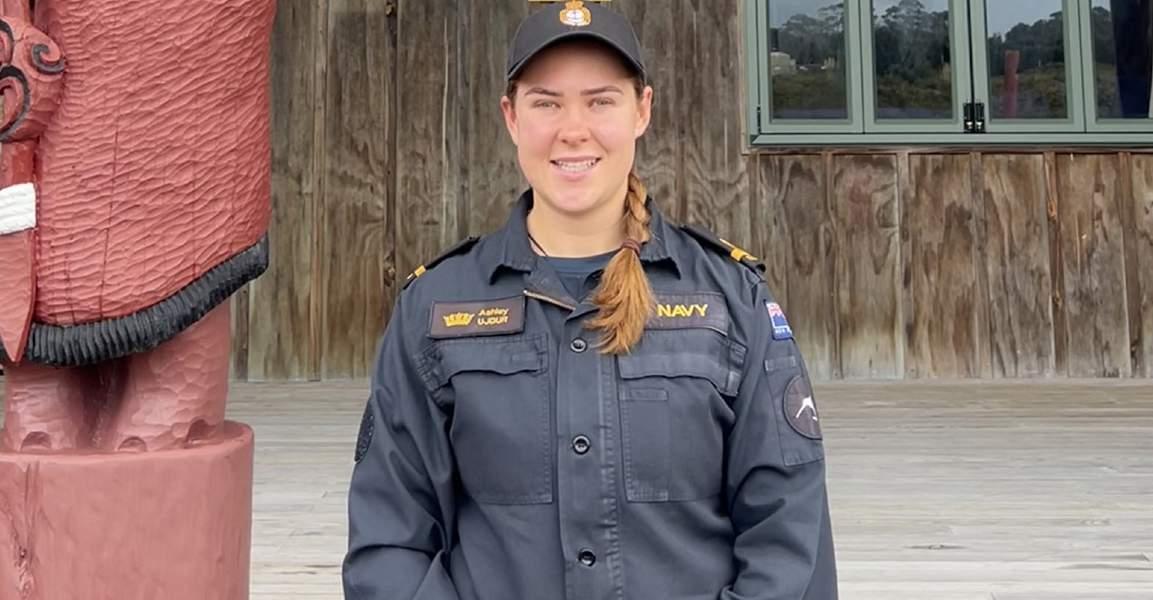
As a Maritime Logistics Officer, she is in charge of the financial planning and budget for a naval ship. “Ships will go out on their deployment and the Maritime Logistics Officer handles the budget side of it, the budget forecasting, and we also do planning for all the food and the equipment that we need when we go out to sea.”
Ashley’s fulltime role is on hold as she is currently studying at Massey University in Albany under the Midshipman Scholarship Scheme run by the Navy. “Most people on the scholarship scheme apply for it before they join the Navy but I applied for it once I had already joined. What it means is I can get
KEY FACTS
paid my fulltime salary and get all my university fees paid for while I am studying.”
Ashley is working towards a Bachelor of Business majoring in Management, which she says fits nicely with her career aspirations.
“You have to convince the Navy that the degree will be beneficial for your career. Management is a big part of maritime logistics and the logistics and finance side I learn in this degree will help my career.”
Growing up in Northland, Ashley attended Kaitaia College. In Year 13, she studied Economics, Statistics, PE, Biology and Classical Studies.
“If I knew then where I would end up, I would be stoked. It has been better than I could have expected. It has been great.”
She encourages school leavers who don’t know what career path to go down to join the Navy.
■ ASHLEY UJDUR IS A MARITIME LOGISTICS OFFICER IN THE ROYAL NEW ZEALAND NAVY, HAVING JOINED OVER FOUR YEARS AGO
■ SHE IS CURRENTLY STUDYING TOWARD A BACHELOR OF BUSINESS MAJORING IN MANAGEMENT AT MASSEY UNIVERSITY UNDER THE MIDSHIPMAN SCHOLARSHIP SCHEME RUN BY THE NAVY
■ ASHLEY’S ROLE AS A MARITIME LOGISTICS OFFICER MEANS SHE IS IN CHARGE OF THE FINANCIAL PLANNING AND BUDGET FOR A NAVAL SHIP
ASHLEY UJDUR



“From the moment you join the Navy, you are getting paid. That is one of the reasons I joined because I wanted to go to university but I didn’t know what I wanted to do after that.
“I thought I would join the Navy and see where that takes me.
“Now, I get to go to uni but I don’t have a student loan like I thought I was going to.”


Being good with people is fundamental to succeeding in the Navy and Ashley says in her job you have to be a people person.
“We are constantly the middleman between people so good communication skills are important, as well as being determined.
“In the Navy, you have to be pretty flexible because when you are posted to a ship plans change all the time, just due to the nature of the job where you can be called out to disaster relief.”

LEAVING SCHOOL ISSUE #27 | LEAVINGSCHOOL.CO.NZ 11
WHAT IT MEANS is I CAN GET PAID MY FULLTIME SALARY AND GET ALL MY UNIVERSITY FEES PAID FOR WHILE I AM STUDYING
ZEALAND NAVY
ROYAL NEW
ACCURATE PROBLEM SOLVER EMERGENCY MEDICAL TECHNICIAN
 writer PETER WHITE
photographer PAULA M c INNES
writer PETER WHITE
photographer PAULA M c INNES

“Every day is different and that is something I love about my role as an emergency medical technician (EMT). You are faced with new challenges and you have to problem solve in real time and think quickly,” says JORDAN TAVARES.
The 21-year-old joined Hato Hone St John Ambulance Service in February this year after completing his Bachelor of Health Science majoring in Paramedicine.
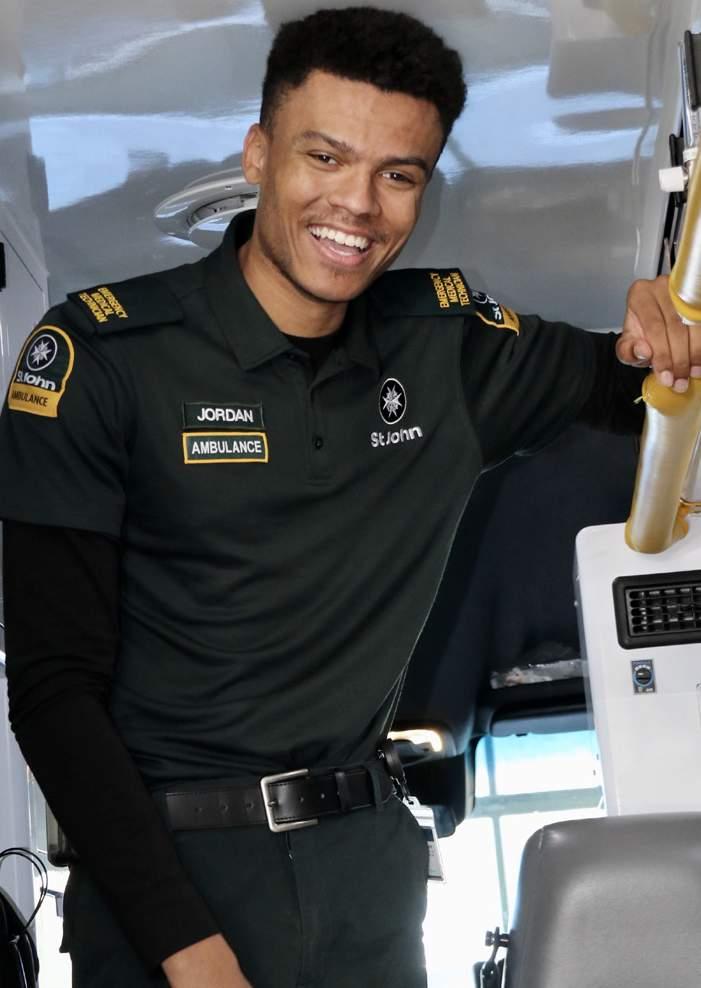
Jordan is based in Whangārei and his work covers a wide area of Northland – from Dargaville to Kaitaia. While he is one of the first responders on the scene of emergencies and accidents, there is also huge variety in his role.
“There is so much to what we do. One shift may be really quiet with helping dementia patients or elderly people who have fallen to the ground and couldn’t get up for a few hours. Then the next shift could be just motor vehicle accidents, cardiac arrests or trauma accidents or a real mixture,” says Jordan.
“Ultimately, all the decisions you make should benefit the patient and you need to get it right the first time. It really keeps you on your toes.”
Jordan is from a family with several health-care workers but growing up, it was not his preferred career option. Right through his time at Whangārei Boys’ High School he wanted to join the Army but because he wears contact lenses, he was not able to join until after he had laser eye surgery, which was not available until he turned 21.
So, he went looking for something that involved problem solving and saw the degree for paramedicine.
“It just interested me straight away and I loved the course. I am really stoked I did it.”
Jordan completed his Bachelor of Health Science at Whitireia in Wellington. It is a three-year fulltime programme, run in conjunction with Wellington Free Ambulance.
“Whitireia are really good at placements and getting us on the road and hands-on experience, which is predominantly what you need in this job. You can only learn so much in the classroom.

“I also liked the in-class experience. All the lecturers are really helpful and gave up extra hours of their time for us.”
KEY FACTS
ULTIMATELY, ALL THE DECISIONS YOU MAKE SHOULD BENEFIT THE PATIENT AND YOU NEED TO get it right the first time . IT REALLY KEEPS YOU ON YOUR TOES.
JORDAN TAVARES
In Year 13 at Whangārei Boys’, Jordan took Psychology, Maths, English, Drama and PE. He would like to encourage school leavers to consider Hato Hone St John as a career option. There are many different roles apart from first responder ambulance service to consider.
“It is definitely a viable option for a career especially now as there is so much opportunity and openings


■ JORDAN TAVARES HAS A BACHELOR OF HEALTH SCIENCE MAJORING IN PARAMEDICINE FROM WHITIREIA IN WELLINGTON
■ HE WORKS AT HATO HONE ST JOHN AMBULANCE SERVICE AS AN EMERGENCY MEDICAL TECHNICIAN
■ JORDAN STUDIED PSYCHOLOGY, MATHS, ENGLISH, DRAMA AND PE IN YEAR 13
for young people. The field of paramedicine is just expanding all the time. There are new roles and positions being created, so if you want to get into paramedicine, it is definitely a good time.”
Jordan says some of the most important traits to have in his role are punctuality, being good at problem solving, having a keen attitude to learn and, most importantly, having empathy for people.
For more information on career opportunities with Hato Hone St John, visit https://join.stjohn.org.nz/ ambulance-careers/home
For more information on studying paramedicine through Whitireia, visit www.whitireiaweltec.ac. nz/study-programmes/health/paramedicine/

PARAMEDICINE LEAVINGSCHOOL.CO.NZ | LEAVING SCHOOL ISSUE #27
12
SHAPING THE LIVES OF CHILDREN

“For as long as I can remember, I have wanted to work with children and help them be the best they can be,” says ELENÉ HEYSTEK.
Her passion for helping children reach their full potential inspired her to study the Bachelor of Early Childhood Studies (BECSt) programme at the University of Auckland.

Elené (20) is nearly halfway through the three-year course.
“I have wanted to do this my whole life. My mum is a teacher and from an early age she brought me with her to class. I helped her design activities and I think that is where my passion grew.
“I have loved children from a very young age. Growing up with three siblings, I used to help them with their homework and the odd project. My heart has always been in working with young children.”
Elené grew up in Pretoria, South Africa. At high school, her favourite subjects were English, Hospitality, History and Business Studies.
“I am kind of a learning junky and really love languages. Anything with books and information is my thing really.”
She loves the BECSt programme she is doing, particularly the practical placements into primary schools.
“The teachers are amazing and so helpful in terms of course work. The placements you go on change your life. I was placed at Whangaparāoa Primary School last semester. The kids were amazing, the staff were amazing, and I think they made my first primary school experience in New Zealand something I will always remember.”
Learning about developmental milestones that every child needs to go through to ensure they can be their best in a learning environment is another aspect that Elené is enjoying.
“Kids are sponges at the end of the day, so everything they see and learn at such a young age, they love it. I feel like we can make such a difference by designing and creating environments and activities that can help them achieve those milestones.
“It is special to be part of those milestones and every big moment they have because they are special beings.”
IT IS SPECIAL TO BE PART OF THOSE MILESTONES AND EVERY BIG MOMENT THEY HAVE BECAUSE THEY ARE SPECIAL beings.
ELENÉ HEYSTEK
Elené says her BECSt studies have made a big difference in her life and for her future.
“I am not sure exactly where I will go in my career, but I will still be working in the same direction with children.
“I am also hoping to do my Masters in Education or even Educational Psychology and maybe even one day I can help write curriculum.


■ ELENÉ HEYSTEK IS STUDYING A BACHELOR OF EARLY CHILDHOOD STUDIES AT THE UNIVERSITY OF AUCKLAND
■ SHE IS THOROUGHLY ENJOYING THE PROGRAMME, PARTICULARLY THE PRACTICAL PLACEMENTS. SHE RECENTLY COMPLETED A PLACEMENT AT WHANGAPARĀOA PRIMARY SCHOOL
■ ELENÉ HAS A GOAL OF COMPLETING A MASTER OF EDUCATION OR EDUCATIONAL PSYCHOLOGY



“If you have the patience and desire to help shape children’s lives then this programme would be awesome. You learn so many things about children and education. All you really need is that passion.”
• If you do wish to become a qualified teacher after doing a BECSt degree, you can simply add a Graduate Diploma in Teaching and be ready for the classroom in just one year.
For more information on studying a Bachelor of Early Childhood Studies through the University of Auckland, visit www.auckland.ac.nz

INSPIRED BY EARLY CHILDHOOD LEAVING SCHOOL ISSUE #27 | LEAVINGSCHOOL.CO.NZ
EARLY CHILDHOOD STUDIES 13
writer PETER WHITE photographer LOGAN WEST
MANAGEMENT
A SPORTING GOOD CAREER RETAIL MANAGEMENT
When she was still at school, CHELSEA PULLEN started working at Rebel Sport in Petone. Now, aged 23, Chelsea leads the Petone store as a member of their management team.
Her love of working with people and the leadership skills she’s developed have proved hugely beneficial in the seven years she’s been working for Briscoe Group.
When Chelsea was finishing Upper Hutt College, she wasn’t sure what she wanted to do long-term, but loved working at Rebel Sport as a Retail Sales Assistant. So Chelsea took up the opportunity to move into a fulltime position.
“When I was at school, I didn’t know what I would do but having the job at Rebel Sport was good because it gave me security. I also knew I was able to go fulltime if I ever wanted to. It is definitely a career I want to stay in,” says Chelsea.
“Now as a manager, my passion is working with people’s strengths and opportunity areas and helping them grow, not just in the job but as people too. Most teenagers start off in retail and often find it is just a job, but I like to work with them to expand their skillsets and build their confidence to help them grow.”
writer PETER WHITE // photographer MARTY MELVILLE
When school leavers join her team, Chelsea looks for people who are willing to step out of their comfort zone and give everything a go.
“Bring ideas to the job you are in. Being a team player, punctual, having confidence, working well alongside others and making friends are all things that will help you as well.”
Although assisting the public can be challenging at times, Chelsea says the strong relationships you develop with your teammates make it much easier to resolve customer queries.
“It is all about creating bonds with the team and making sure they have support from their managers. “That was another reason I went into a management role – to ensure that my team have the support that they need to get through tough situations.”
In Year 13, Chelsea took English, Health and Food Technology, Sports Leadership and PE. She also took a Gateway course in Retail, which gave her hands-on experience one day a week. She finished top of her class and says the Gateway course has helped her advance in her career.
“The Retail course helped me in the job I was doing part-time. There were things I learned on the course that I was able to apply in my role at
Make an impact in the lives of young children
Study the Bachelor of Early Childhood Studies from New Zealand’s top university*
The Bachelor of Early Childhood Studies is an innovative programme focusing on the early years of children’s lives and is ideal for students who want to make a difference for young children, are interested in early childhood education and want to explore multiple career pathways.

• Interdisciplinary courses cover a wide range of topics including human development, educational psychology, pedagogy and practice, and Te Ao Maori


• First-hand, practical experience supported by your teachers and mentors
• A total of 24 weeks over three years placed in a range of early childhood settings, allowing you to gain practical experience and form professional connections
Simply add a one-year Graduate Diploma in Teaching if you wish to become a teacher
RETAIL
14
THAT WAS ANOTHER REASON I WENT INTO A MANAGEMENT ROLE – TO ENSURE THAT MY TEAM HAVE THE SUPPORT THAT THEY NEED TO GET THROUGH TOUGH SITUATIONS .
CHELSEA PULLEN
Find out more and apply: auckland.ac.nz/becst Get in touch: education@auckland.ac.nz
*NZ’s #1 university for Education as a subject, 2023 QS World University Rankings by Subject
Briscoe Group, which was really beneficial.”
Chelsea says she is ambitious to go further within Briscoe Group.

“The support here has been amazing and the people I work with are great. I take it year by year, if not day-by-day, but I would like to keep progressing through the business. That has always been my goal.”

■ CHELSEA PULLEN IS PART OF THE MANAGEMENT TEAM AT REBEL SPORT IN PETONE. SHE STARTED WORKING THERE PART-TIME AS A RETAIL SALES ASSISTANT WHILE SHE WAS AT HIGH SCHOOL
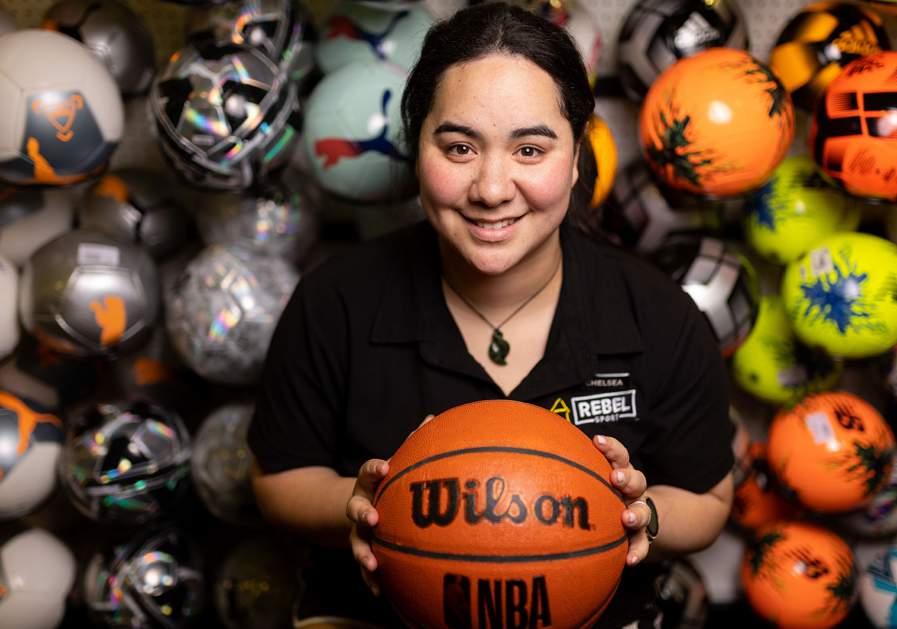
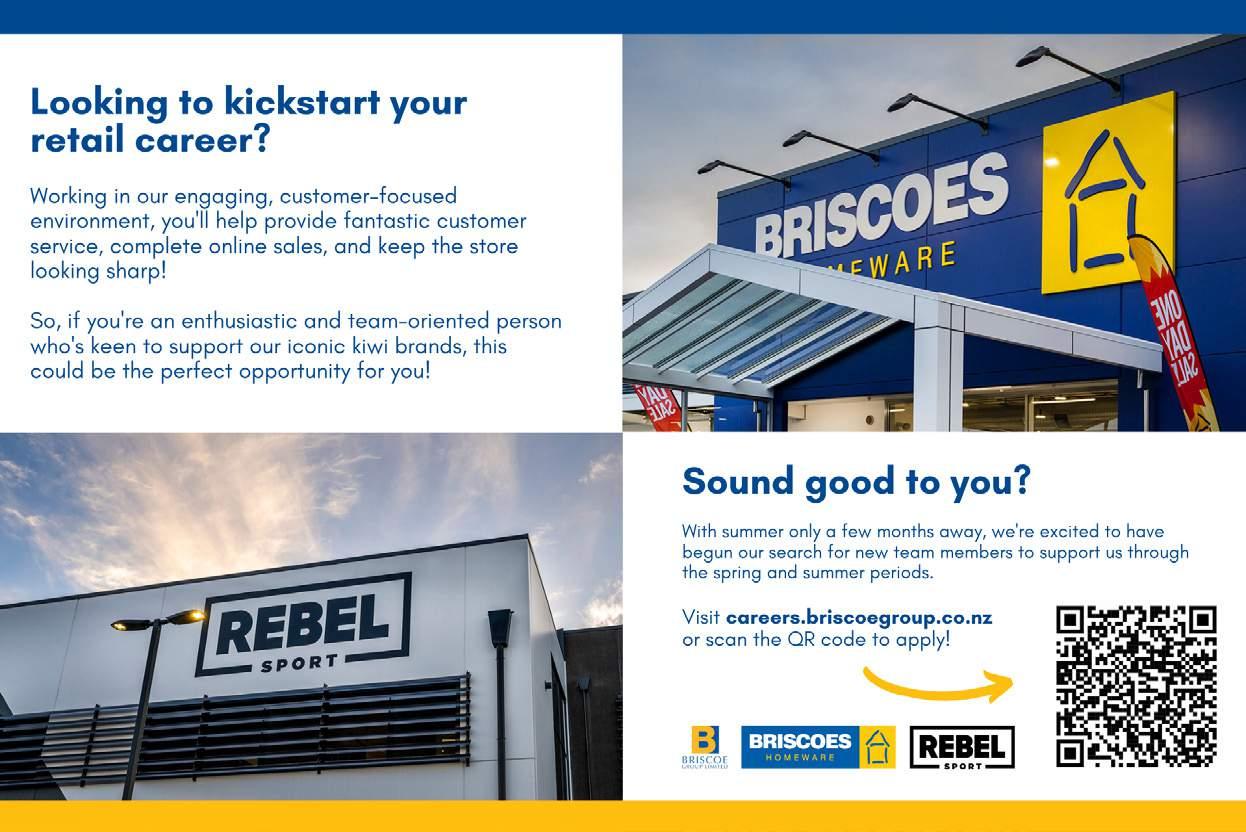
■ SHE STUDIED ENGLISH, HEALTH AND FOOD TECHNOLOGY, SPORTS LEADERSHIP AND PE IN YEAR 13, AS WELL AS TAKING A GATEWAY COURSE IN RETAIL
■ CHELSEA’S GOAL IS TO KEEP PROGRESSING THROUGH THE BRISCOE GROUP BUSINESS AND ADVANCE HER CAREER.
For more information on career opportunities with Briscoe Group, visit www.briscoegroup.co.nz/careers



RETAIL MANAGEMENT 15
Keen to start your apprenticeship?
The average student loan for university graduates is:
$ 41,457 $ 0.00
The average student loan for apprentices is:
Student loan data based on completing a three year degree prior to 2022. Source: Scarlatti October 2022
BCITO.org.nz/get started Find out more at
1963-04-23-SCHOOL
BATTLING TO THE TOP ACTIVE APPRENTICE RATES JOINERY
writer PETER WHITE photographer LUKE MARSHALL
Keeping a positive outlook no matter what life throws at you has proved a winning formula for TANITA GARNETT. The 20-year-old is a top player for provincial rugby team Tasman Mako and is also halfway through a successful joinery apprenticeship.
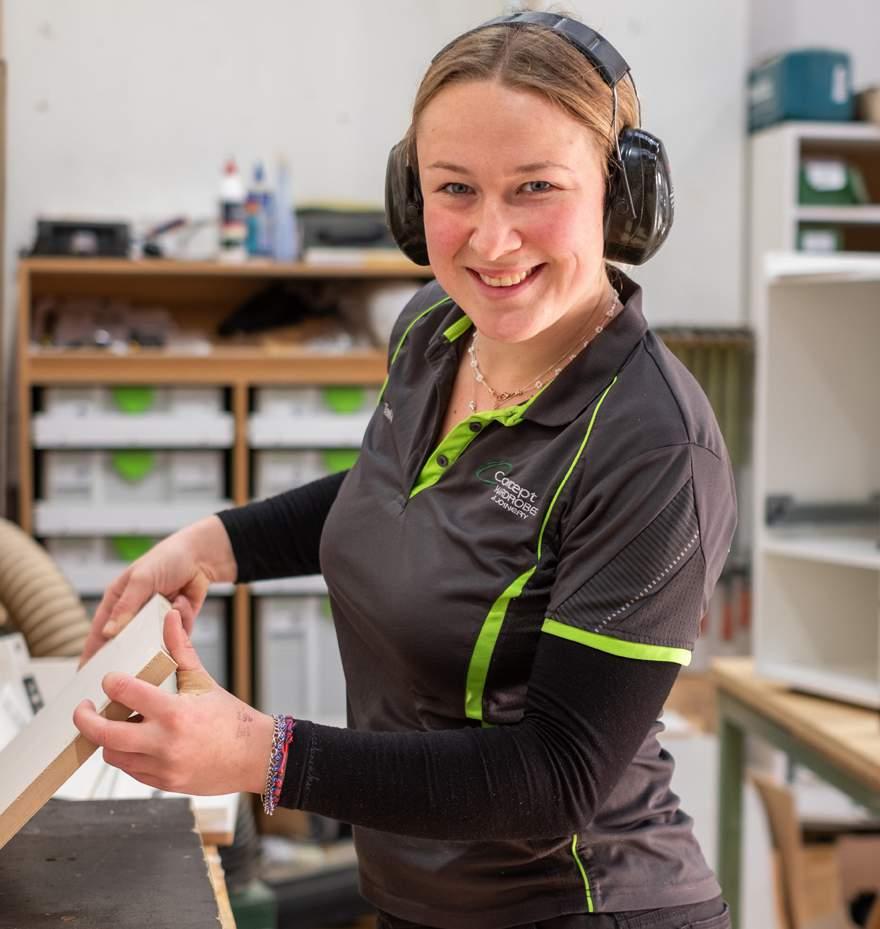
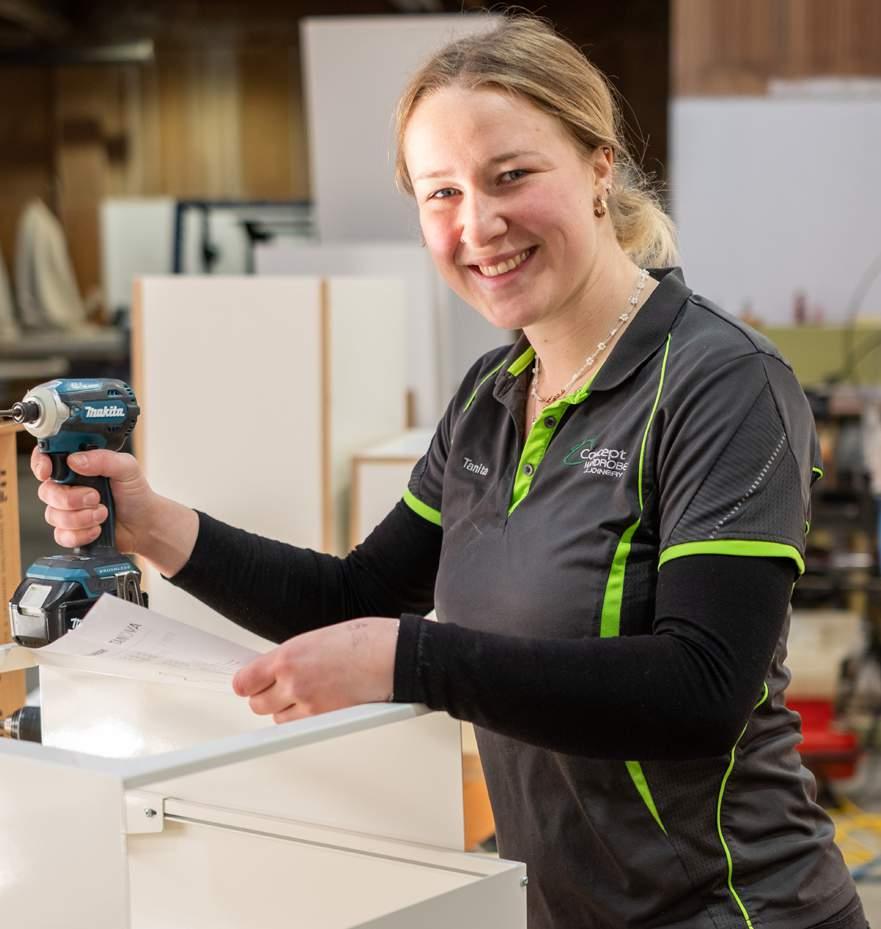
But she has had to endure more than her fair share of challenges.
Tanita was just seven when a tumour was found behind her ear and she was treated with chemotherapy for a year. Then, at the age of 10, she was diagnosed with a type of leukaemia called Langerhans Cells Histiocytosis (LCH).
“That was a massive part of my childhood. I feel that’s part of the reason I have to prove to myself that I can do stuff and I can be strong. That no matter what your past is like, you can push through,” says Tanita. She has been healthy since she was 12, which is a blessing. The suffering she went through has undoubtedly made her mentally strong.
“For me, it has definitely been a journey and I think everything I have been through has made me the person I am today, but you still have your struggles and you still have your battles.”
Tanita started playing rugby aged 14 and has been a regular player for Tasman Mako in the national Farah Palmer Cup competition since 2020. The Black Ferns is a giant goal but she is not getting too far ahead of herself.
Tasman Mako played a key role in her taking up an apprenticeship through BCITO | Te Pūkenga. Tanita admits she did not know what joinery was until her team’s personal development manager told her there was an apprenticeship spot with Concept Wardrobes in Nelson.
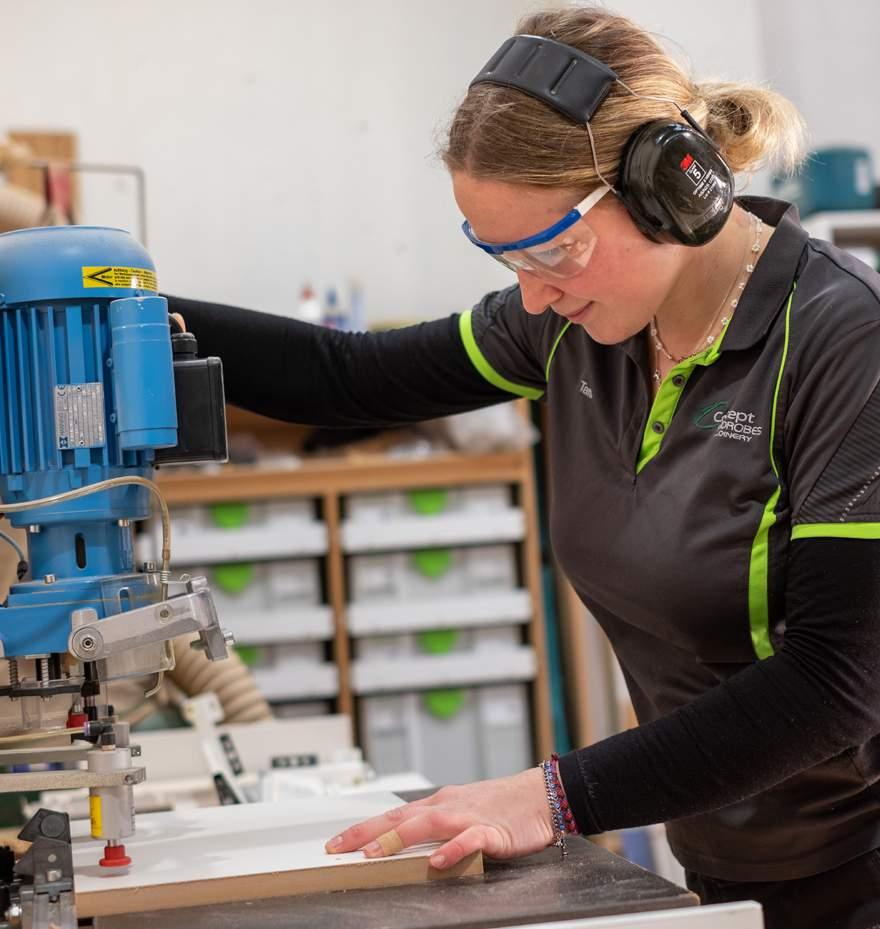
“I thought I would give it a go and have enjoyed it enough to keep going. I started about one-and-a-half years ago and, once I started, BCITO | Te Pūkenga have been really helpful. If I ever have any questions, they will answer them within the day.”

KEY FACTS

Tanita says the job suits her because she likes to keep active and says she can work the joinery apprenticeship around her rugby training and games.
Mostly she works on kitchens, wardrobes and various joinery projects.
“We manufacture them and we also go out and install them as well. I like



to do lots of different work and feel like I am still learning.
“In some jobs, like labouring, it can get quite laborious in some ways but I feel I get a good mixture of being able to learn and work at the same time.”
Tanita was home schooled and rates English and Science as her favourite subjects. She recommends getting
a trades apprenticeship for any school leaver who is not 100 per cent sure whether they want to go to university or not.
“It is great because you get to learn and you are also making money at the same time. Just like sport, it is not easy but if you keep working hard you will get there.”
■ TANITA GARNETT IS COMPLETING AN APPRENTICESHIP IN JOINERY THROUGH BCITO | TE PŪKENGA. SHE WORKS AT CONCEPT WARDROBES IN NELSON
■ SHE RECOMMENDS A TRADE APPRENTICESHIP FOR ANY SCHOOL LEAVER WHO IS NOT SURE IF THEY WANT TO GO TO UNIVERSITY
■ TANITA ALSO PLAYS IN PROVINCIAL RUGBY TEAM TASMAN MAKO AND SAYS THAT IT IS GREAT SHE CAN WORK THE JOINERY APPRENTICESHIP AROUND HER RUGBY TRAINING AND GAMES
For more information on apprenticeships in joinery through BCITO | Te Pūkenga, visit www.bcito.org.nz
LEAVING SCHOOL ISSUE #27 | LEAVINGSCHOOL.CO.NZ
APPRENTICE JOINER 17
I FEEL I GET A GOOD MIXTURE OF BEING ABLE TO LEARN AND WORK AT THE SAME TIME.
TANITA GARNETT
LIGHTING HER OWN PATH APPRENTICE TAKES CHARGE
writer PETER WHITE photographer ALAN STEVENS
“I left school after Year 12 because I knew what I wanted to do”, says KENDYLL BLISSETT. “My friends were all going to uni but I knew I wanted to start my career doing an electrical apprenticeship.”
Kendyll took up her apprenticeship with Fonterra at their Lichfield site in Waikato, about midway between Putaruru and Tokoroa.
The 19-year-old is one of 13 apprentices who started with Fonterra in January 2021 as part of the firm’s commitment to expand its apprenticeship programme.
Fonterra recruits for a new cohort of apprentices each year during term three, with a start work date of the following January.
Currently, there are approximately 100 Fonterra apprentices who work across 28 manufacturing sites in New Zealand. The apprenticeships are spread across a range of disciplines – including Electrical, Mechanical and Heavy Automotive Engineering, Dairy Processing, as well as an Energy Centre Traineeship. There is a very high qualification rate of 95 per cent.
Kendyll really enjoys the mix of theory and practical work in her apprenticeship.
“You have your night-class learning and your on-job learning. Every week, I go to Etco and sit in a classroom and learn the theory behind electrical.
KEY FACTS
At work, you have on-job tasks to complete, and you need to be deemed competent in that and the theory in order to get your registration.
“I am doing domestic, commercial and industrial work, so I am quite lucky that Fonterra farm me out to other companies to do some of the work required. You are doing something with a purpose, for a purpose.”
Kendyll also enjoys working at the large Lichfield site as there are so many mentors and people to learn from. Many more women have joined the trades industry in recent years. Kendyll is all for it and says there are so many opportunities for young women in the industry.
Of her experience as a woman in the trades, she says, “As a female I know where the line is between right and wrong, but I am not afraid to give a bit of banter back. It works well for me.”
Kendyll went to Hamilton Girls’ High School. She originally considered becoming a radiologist but taking the Waikato Institute of Technology (WINTEC) Trades Academy class offered at Hamilton Girls’ was a key turning point for her.
■ KENDYLL BLISSETT IS CURRENTLY COMPLETING AN ELECTRICAL APPRENTICESHIP. SHE BEGAN AT FONTERRA’S LICHFIELD SITE IN WAIKATO IN JANUARY 2021
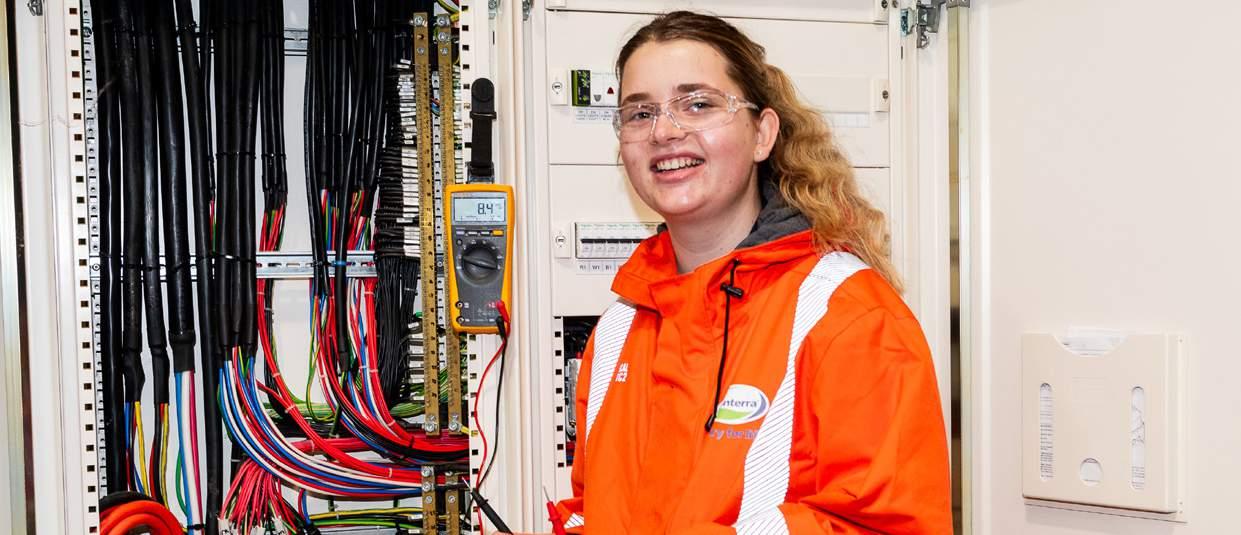
■ SHE ENJOYS THE MIX OF THEORY AND PRACTICAL WORK OF HER APPRENTICESHIP – THE DAILY ON-THE-JOB LEARNING WITH FONTERRA AND THE WEEKLY THEORY CLASSES AT Etco
■ KENDYLL WAS AWARDED A PRIME MINISTER’S VOCATIONAL EXCELLENCE AWARD IN 2019, WHICH HELPED HER TO MAKE THE DECISION TO PURSUE A CAREER IN THE TRADES
“Once a week we would go to WINTEC. We did eight weeks of plumbing and gasfitting, eight weeks of carpentry and eight weeks of electrical. That’s when I knew what I wanted to do, despite my friends and teachers wanting me to wait and go to university.

“Some people think that trades are for those who are less intelligent, but that’s just not the case and I wanted to show them that. I remember reading LeavingSchool magazine and most of my teachers were pushing for me to go to uni but I didn’t want to do that.”
In 2019, Kendyll was awarded a Prime Minister’s Vocational Excellence Award, which recognises the achievements of students excelling in vocational education.
“It was the final recognition I needed that this was the path for me – to go into the trades.”

Kendyll has talked to students at schools as part of her role with Fonterra. She says her focus was on getting the students to follow their hearts, noting that adults’ influence does have a lot to do with career decisions.
“The trades are for anyone. If you put your mind to it, you can definitely do it.”

For more information on career opportunties with Fonterra, visit www.fonterra.com/earlycareersnz and to learn about Fonterra’s partnership with Te Pūkenga across all its apprentice programmes, visit www.tepūkenga.ac.nz
For more information on electrical apprenticeships through Etco, visit www.etco.co.nz


LEAVINGSCHOOL.CO.NZ | LEAVING SCHOOL ISSUE #27
ELECTRICIAN
MY FRIENDS WERE ALL GOING TO UNI BUT I KNEW I WANTED TO START MY CAREER DOING AN ELECTRICAL APPRENTICESHIP.
KENDYLL BLISSETT
ENERGISED FOR THE FUTURE


AIM FOR A TRAINEESHIP
writer PETER WHITE // photographer ALAN STEVENS
“It is an exciting industry to be in. I love the dynamic environment and how no two days are the same, plus working with some cutting-edge equipment,” says EDDIE CRAIG.
Eddie (27) is an Energy Centre trainee with Fonterra and is based at their Te Rapa site, which is near Hamilton. The role is hugely varied – across treated water, steam generation, electricity, refrigeration and compressed air – working to keep the site operational.
It is his second placement with Fonterra. Eddie did a four-year apprenticeship in mechanical engineering (Level 4), before leaving to work in other parts of New Zealand for two years.
“Competenz provided me with the resources and documentation during my apprenticeship. It was good, with a range of learnings that covered off quite a few skills and was job specific.

“I came back in as a mechanical engineer and then a role came up while I was here to move into the Energy Centre and do a traineeship. I am going through my Energy Chemical Processing Certificate at the moment, which is all about how to operate a plant that provides energy and various utilities to the production plant.
“We provide the dairy factory with all the utilities – like compressed air, boiler refrigeration, steam and power. We operate and maintain all the equipment that provides that.”
Eddie says Fonterra look after their staff really well and there are lots of perks.
“The shift patterns are really good, making for a great work–life balance. I was provided with my tools and heaps of training when I did my apprenticeship. I have got my forklift and dangerous good licences, plus a range of different certifications that they put me through, and it didn’t cost me a thing.
“There is such a range of experienced people you get to work with. I am grateful to have gone through my apprenticeship here and there are so many learning pathways available with Fonterra.”
Eddie went to Forest View High School in Tokoroa. In Year 12, he took PE, High Performance Sport, English, Physics, Maths and Statistics. He continued to do well and achieved NCEA Level 3 but was always keen to get into engineering as a career.
“I left school and did kind of a gap year for a company making hydraulic hoses. I had actually signed up to go to uni to do mechanical engineering and then the apprenticeship came up.”

“I have always been a hands-on person. I really like being able to pull something apart, understand it and how to fix it and put it back together. I like seeing how machines work.
“When I was younger, I really liked pulling my mountain bike apart and giving that a clean and putting it back together. I still enjoy that about my job now.”
Eddie encourages school leavers to get an apprenticeship if they can.
“I wouldn’t be where I am today. I have been presented with a range of opportunities, which would not have been provided to me without Fonterra”.
“Doing an apprenticeship put me a step ahead of some of my mates who went to uni and have big student loans. You get straight into earning pretty good dollars and gain the skills you need on-the-job.”
KEY FACTS
■ EDDIE CRAIG WORKS AT FONTERRA’S ENERGY CENTRE AT THEIR TE RAPA SITE AND IS COMPLETING A TRAINEESHIP. IT COVERS A WIDE RANGE OF AREAS, SUCH AS TREATED WATER, STEAM GENERATION, ELECTRICITY, REFRIGERATION AND COMPRESSED AIR

■ HE HAS EARLIER COMPLETED A FOUR-YEAR APPRENTICESHIP IN MECHANICAL ENGINEERING (LEVEL 4) AND WORKED AS A MECHANICAL ENGINEER AROUND NEW ZEALAND

■ EDDIE RECOMMENDS A TRAINEESHIP AT FONTERRA TO SCHOOL LEAVERS SAYING HE HAS BEEN PROVIDED WITH MANY OPPORTUNITIES, GREAT PERKS AND HAS DEVELOPED PLENTY OF SKILLS
For more information on career opportunities with Fonterra and to see all of their current early career programmes, visit www.fonterra.com/earlycareersnz
For more information and to learn about Fonterra’s partnership with Te Pūkenga across a range of engineering and dairy processing apprentice programmes, visit www.tepūkenga.ac.nz
LEAVING SCHOOL ISSUE #27 | LEAVINGSCHOOL.CO.NZ
ENERGY CENTRE TRAINEE 19
I AM GRATEFUL TO have gone through MY APPRENTICESHIP HERE AND THERE are so MANY LEARNING PATHWAYS AVAILABLE WITH FONTERRA .
EDDIE CRAIG
CAREER MOMENT
writer PETER WHITE photographer SANDRA HENDERSON
INSPIRING FEMALE TRADIES
“I’d love to inspire other females to join the trade and give it their best shot and we can make a very cool community of female tradies taking over the world,” says NICOLA VAN DER WESTHUIZEN.
Nicola is an electrical apprentice with Silver Fern Farms and is based at their site in Hāwera, Taranaki.
“There are so many things that really inspire me. I really like doing the pre-inspections in the morning to make sure the machines are working and I also like fault finding when something goes wrong. It gives me an adrenaline rush to solve problems on the spot.
“An example is when we had a motor that decided to give up during production, so we spent half the day trying to put parts together to make this one conveyor go. Five hours later and tuckered out, we managed to fix it.”
The 22-year-old will be two years through her apprenticeship in October and being a woman in a male-dominated industry does not faze Nicola.
“It’s great. I think a lot more women can be confident of going down

the path that I did. You get to see a different perspective and it is challenging to work alongside knowledgeable men.
“The culture at Silver Fern Farms is that everyone is very hard working and they are a great team.”
annoying me. I thought it would be a good idea to invent a Taser to taser them! I guess that was my childish version of thinking of electrical stuff back then.
“Then the COVID virus happened and I saw people were struggling to find jobs. I looked at trades and saw they were looking for people to come help out around New Zealand.


“I thought I would give it a go as I still had my plan of becoming an electrician and Silver Ferns took me on.
“Silver Ferns gave me the opportunity; they kept encouraging me and gave me the ability to study while still working.”
“They strive to motivate me to be the best version of myself by giving me the freedom to input ideas when problems arise, instead of leaving me on my own.
Nicola’s desire to be an electrician began when she was just 10 and steadily grew through her teenage years.
“I was sitting in science class learning about batteries and these guys were

Nicola went to Stratford High School. In Year 13, she took Calculus, Physics, English, History and Tourism.
She wanted to get as many credits as she could –in case she did not get a trade and had to go to university.
Make sure you’re ready to have your say at this year’s general election on the issues that matter to you.
If you’re 17, fill out an enrolment form now and you’ll be automatically enrolled when you turn 18. Enrol now at vote.nz

GET READY TO VOTE
ELECTRICIAN
LIGHT-BULB
I’D LOVE TO INSPIRE OTHER FEMALES TO JOIN THE TRADE AND GIVE IT THEIR BEST SHOT AND WE CAN MAKE A VERY COOL COMMUNITY OF FEMALE TRADIES TAKING OVER THE WORLD.
NICOLA VAN DER WESTHUIZEN
Her dream is to become a project engineer one day and design better electrical systems to make a difference to the planet by reducing waste and plastic.
Her advice to school leavers is to take NCEA subjects like Maths and Physics as they help, as does having some practicality skills and being fit too.
“But most of all have a good, positive attitude and don’t be afraid to get your hands dirty.”


KEY FACTS
■ NICOLA VAN DER WESTHUIZEN IS CURRENTLY COMPLETING HER ELECTRICAL APPRENTICESHIP SHE WORKS AT SILVER FERN FARMS AT THEIR SITE IN HĀWERA, TARANAKI
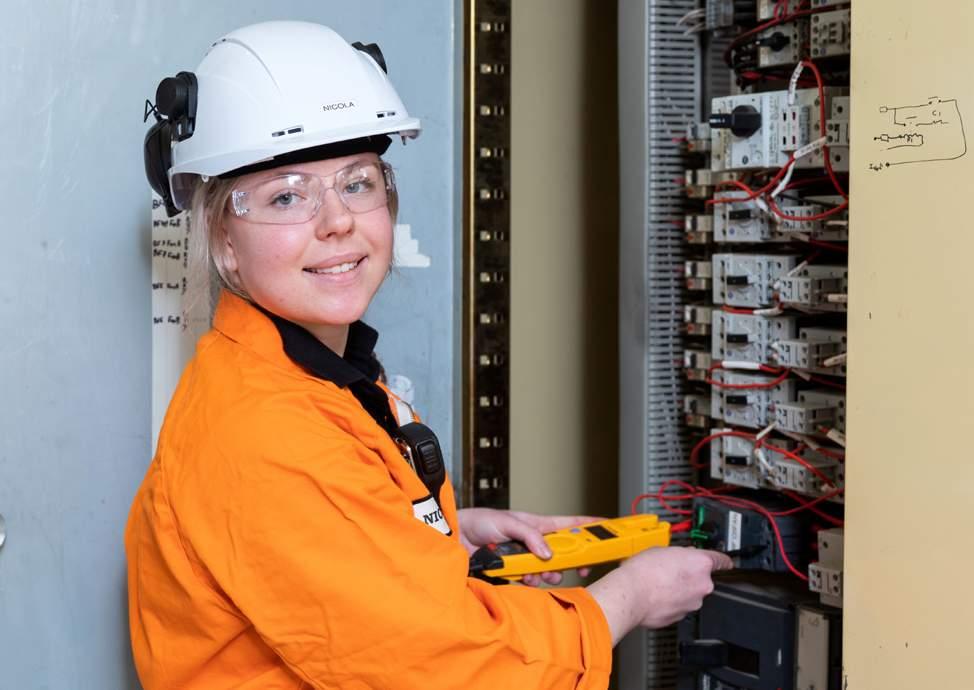
■ SHE RECOMMENDS THAT SCHOOL LEAVERS INTERESTED IN AN ELECTRICAL APPRENTICESHIP STUDY MATHS AND PHYSICS, HAVE A POSITIVE ATTITUDE AND ARE PHYSICALLY FIT

■ NICOLA STUDIED CALCULUS, PHYSICS, ENGLISH, HISTORY AND TOURISM IN YEAR 13
For more information on career opportunities with Silver Fern Farms, visit careers.silverfernfarms.com/home
Earn while you learn with Silver Fern Farms.
We know money matters...so come and make it here.
Gain lifelong qualifications (NZQA) and earn some cash along the way as part of the Silver Fern Farms whānau. Join us as a Team Member over the summer holidays or once you leave school. We’ve got heaps of jobs available – you could be a knife hand, packer, bagger, freezer hand or general labourer. We’ll help you find the right fit to suit you best.
Check out the jobs at the site nearest to you and click APPLY or go to our website.
careers.silverfernfarms.com
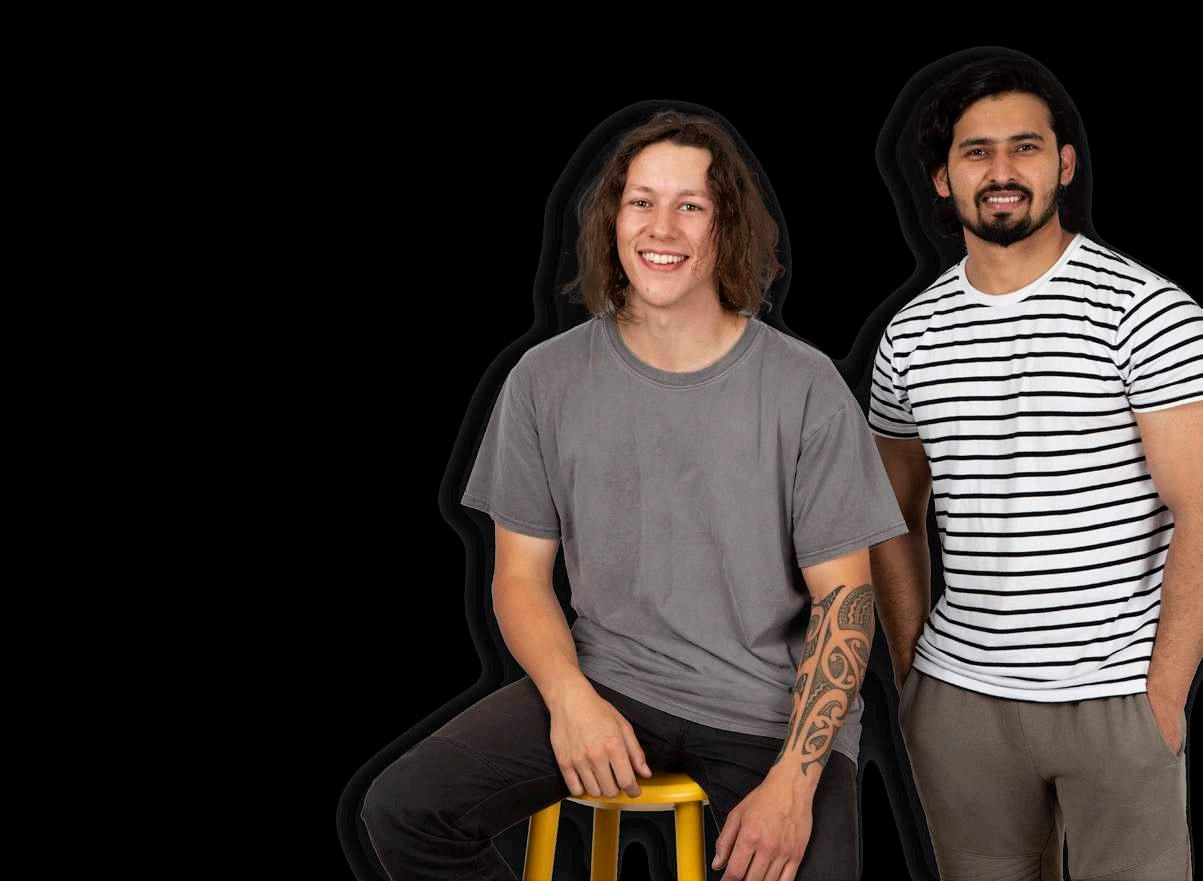


ELECTRICIAN 21
EXCITED FOR ENGINEERING AGGREGATE AND QUARRY INDUSTRY
ZANE YEE recommends engineering as a career with a bright future for young people. He says there is so much personal fulfilment you can get from solving a problem and completing a project.
Zane (28) has worked as an industrial engineer with Fulton Hogan in Auckland since July 2022. He is associated directly with Stevenson Aggregates Ltd, a subsidiary of Fulton Hogan.
“I am involved more in the quarrying business of Stevenson. I focus on production and manufacturing. In my role, I do a lot of plant design, looking after plant performance efficiency, and finding ways to improve the whole production process,” says Zane.
“I am also involved in a start-up project where we are building a trial plant. I handled the design and the commissioning of the plant as well.”
One of the key organisations in the industry is the Aggregate & Quarry Association (AQA). Members nationwide produce more than 45 million tonnes of aggregate, limestone and allied products each year. That’s about nine to 10 tonnes or a truckload for every New Zealander.
“AQA is an organisation who represent the quarrying industry. If there is any advocacy, technical or planning/consenting issues within the industry, then AQA is the go-to organisation to assist.


They represent the whole quarrying industry and they act as a voice so when we are developing a new specification, they act as the co-ordinator to communicate with all industry members. Everyone can talk together.”
Zane also does quarry surveying where new technology is used, such as drones to do aerial quarry surveys and mapping the whole topography of the quarry.
“We then can use a lot of the data from the survey to measure quarry volumes, display depths of upcoming blasts and review extraction against established designs. We can also visualise a whole lot of 3D design of the quarry. Specifically, 3D design refers to the quarry pit shell. That is the target we want to extract from the quarry.”
From Malaysia originally, Zane worked first in Singapore for four years before making his way
to Aotearoa three years ago, just before the first COVID-19 lockdown.
He finished his final year of a Bachelor of Engineering, majoring in Mechanical Engineering, from Auckland University of Technology, having credits added from his overseas qualifications in Malaysia.
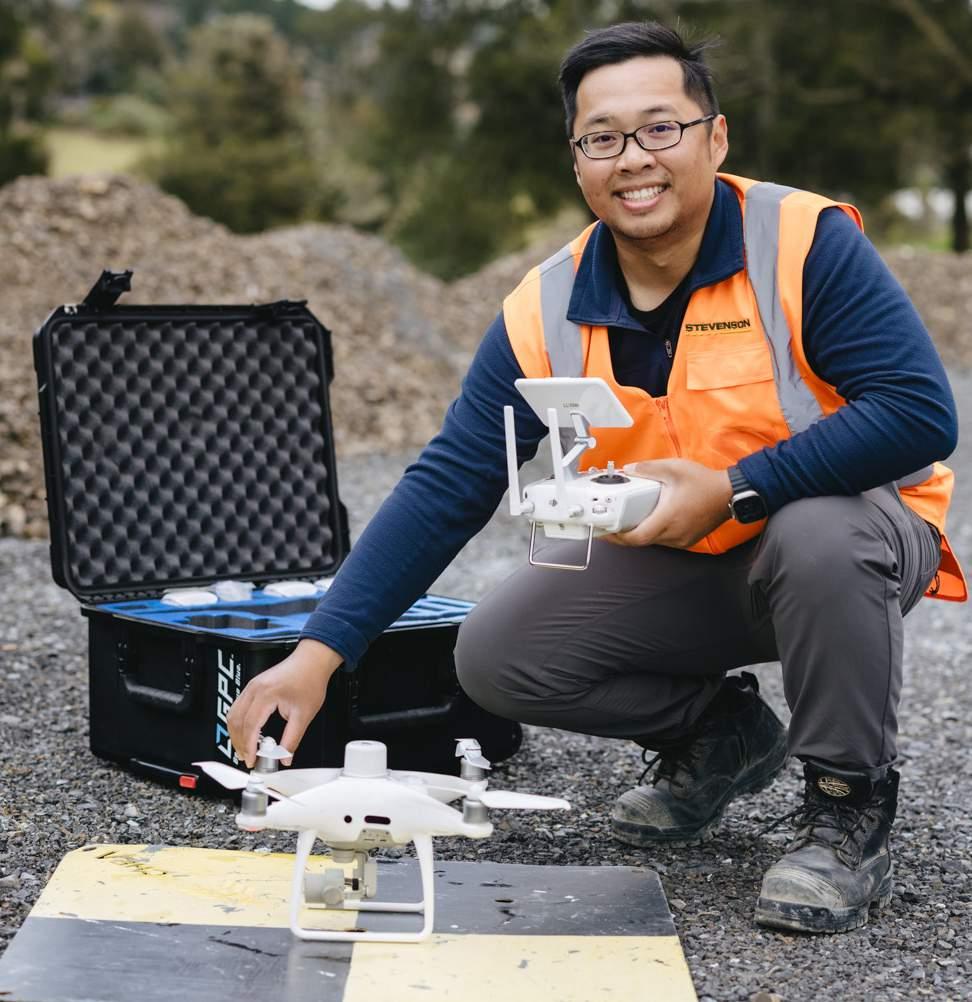
“With the learning I had done in the past, I did a credit transfer to AUT. They exempted me from the first two years of their three-year programme. It was great at AUT. The best part was we got lots of opportunities to apply hands-on skill.
“There were lots of assessment and projects where we could build something from the ground up. It tested our theoretical knowledge and also tested our
 writer PETER WHITE photographer LOGAN WEST
writer PETER WHITE photographer LOGAN WEST
practical skill as well. In one project we designed a crane system.
“It is really about the opportunity to work with other people, coming up with something new and the whole experience was great.”
■ ZANE YEE WORKS AS AN INDUSTRIAL ENGINEER AT STEVENSON AGGREGATES LTD, A SUBSIDIARY OF FULTON HOGAN
■ HE HAS A BACHELOR OF ENGINEERING MAJORING IN MECHANICAL ENGINEERING FROM AUCKLAND UNIVERSITY OF TECHNOLOGY, AS WELL AS QUALIFICATIONS EARNED IN MALAYSIA
■ ZANE FOCUSES ON PRODUCTION AND MANUFACTURING IN HIS ROLE AND IS INVOLVED MORE IN THE QUARRYING SIDE OF THE BUSINESS


For more information on career opportunities in the aggregate and quarry industry, visit www.aqa.org.nz

ENGINEERING 22
LEAVINGSCHOOL.CO.NZ | LEAVING SCHOOL ISSUE #27
I AM ALSO INVOLVED IN A start-up PROJECT WHERE WE ARE BUILDING A TRIAL PLANT I HANDLED THE DESIGN and THE COMMISSIONING of the plant as well .
ZANE YEE
AWARD-WINNING APPRENTICE EFFORT REAPS REWARDS
BAILEY JACKSON is the first to admit that he did not have a great time at school. He left St John’s College in Hamilton as soon as he turned 16 and went straight into building work with his dad.
The 26-year-old, who has dyslexia, has continued to work hard and tried to improve himself by doing extra study.
Bailey has been with Hamilton Panel Works since 2017 and last year the Collision Repair Association awarded him CRA Golden Hammer National Apprentice of the Year.
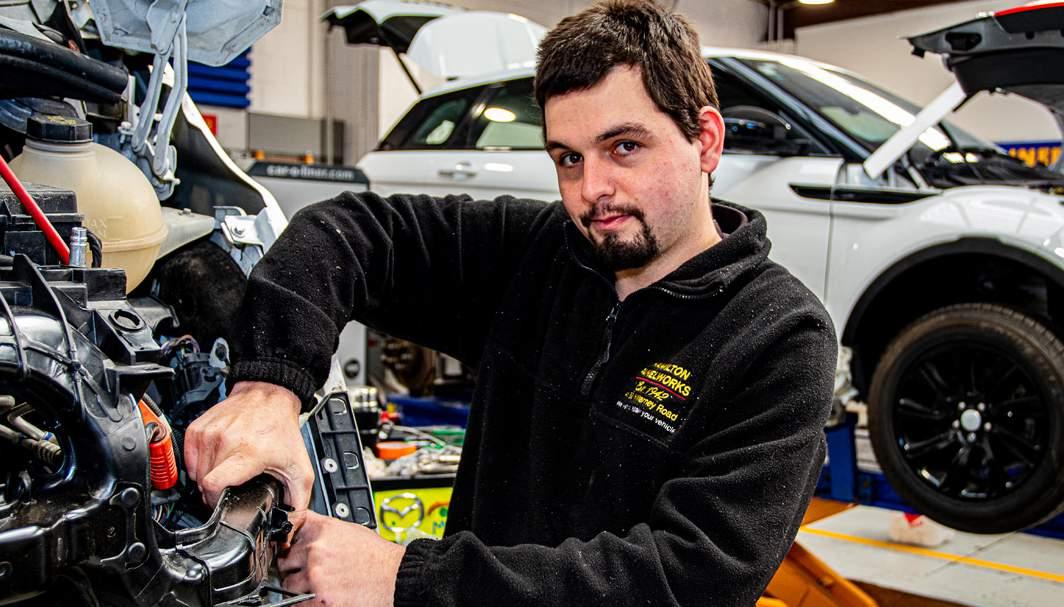
It was a momentous occasion for Bailey, who is the oldest of 14 in his family. But there was absolutely no way he knew the title of Apprentice of the Year was coming to him.
“To be honest, it was a massive shock. I was a bit nervous as my boss Jeff called me into the office and there were five guys in there. I thought I had done something wrong. They then all shook my hand and told me I had won the Golden Hammer


award. I went pale white and will never forget that,” says Bailey.


“I could not have won it without the help from the staff and my bosses, Jeff and Brett. It is a great place to work at and I am so privileged to work in the paint and panel industry as they are all nice people.”
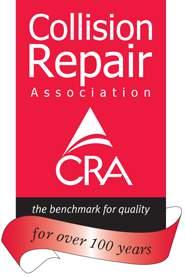
Bailey has completed MITO’s New Zealand Certificate in Collision Repair (Non Structural) (Levels 3 and 4). He is currently working towards gaining Level 5 and then is looking to accomplish Level 6.
“MITO have been so helpful. The first year I struggled with the paperwork as I had not done an apprenticeship before in the automotive industry. I am really grateful to everyone who helped me because without them I would not be in the position I am now.

“I just want to show my younger brothers that if I can do it then they can do it too. You just have to have the mindset and the patience. You can’t beat yourself up over not being able to do as well at school.”
There is no doubt Bailey is highly motivated to keep improving himself.
writer PETER WHITE photographer ALAN STEVENS
After leaving school without qualifications, he studied at Fairfield College during the school holidays and achieved NCEA Level 1 in English. It was a major achievement for him and gave him the confidence to apply for an apprenticeship with Hamilton Panel Works.
He would like to encourage others who may be struggling at school to not give up hope. He has proven there is a way through to a career in the trades if you work hard at it.
“I think for any young person who struggles with paperwork there will always be trade jobs out there if you want to work and have the dedication.
“If you put that 110 per cent in, then you will succeed. That is what I have done and I am feeling confident about the future.”

LEAVING SCHOOL ISSUE #27 | LEAVINGSCHOOL.CO.NZ
AN
■ BAILEY LEFT HIGH SCHOOL WITHOUT QUALIFICATIONS BUT THEN WORKED HARD TO ACHIEVE NCEA LEVEL 1 IN ENGLISH, WHICH GAVE HIM THE CONFIDENCE TO PURSUE
APPRENTICESHIP KEY FACTS
YOU JUST HAVE TO HAVE THE MINDSET AND THE PATIENCE. YOU CAN ’T BEAT YOURSELF UP OVER NOT BEING ABLE TO DO AS WELL AT SCHOOL .
23 COLLISION REPAIR
BAILEY JACKSON
CAREERS NEW ZEALAND

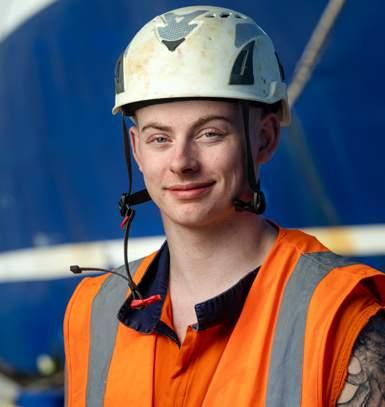
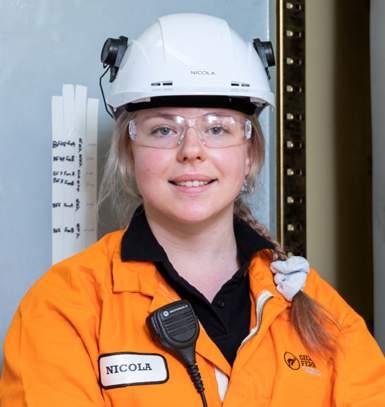
A fantastic resource providing expert advice and confidential, free information on all things education and employment – including choosing school subjects, enrolling in study or training and applying for jobs. Call their free advice line on 0800 222 733, free text CAREER to 434 or chat online by visiting their website at www.careers.govt.nz
FEELING DOWN?
Leaving school is one of the most major transitions we undertake in our lives, and it’s a time when anxiety, worry and depression can surface. www.thelowdown.co.nz is full of ideas and people who can help you get unstuck and get to a better place. Need
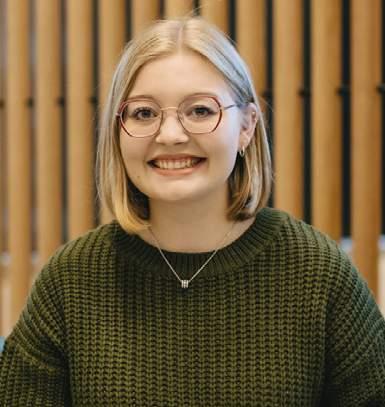
UNIVERSITY/POLYTECHNIC OPEN DAYS 2023
rather to




























a man of value.
Albert Einstein
The pessimist sees difficulty in every opportunity. The optimist sees opportunity in every difficulty. Winston Churchill



IMPORTANT NOTICES LEAVINGSCHOOL.CO.NZ | LEAVING SCHOOL ISSUE #27 24
become
to
talk? Free text to 5626
MyJobSpace – www.myjobspace.co.nz Student Job Search – www.sjs.co.nz Do Good Jobs – www.dogoodjobs.co.nz Work and Income –www.job-bank.workandincome.govt.nz Seek – www.seek.co.nz ELENÉ HEYSTEK EARLY CHILDHOOD STUDIES – SEE PAGE 13 Tertiary provider Date Website MASSEY UNIVERSITY Manawatū Campus 2 Aug www.massey.ac.nz MASSEY UNIVERSITY Auckland Campus 11 Aug www.massey.ac.nz SIT I nvercargill Campus 25 Aug www.sit.ac.nz VICTORIA UNIVERSITY 25 Aug www.victoria.ac.nz MASSEY UNIVERSITY Wellington Campus 25 Aug www.massey.ac.nz UNIVERSITY OF AUCKLAND 26 Aug www.auckland.ac.nz AUCKLAND UNIVERSITY OF TECHNOLOGY 26 Aug www.aut.ac.nz UNITEC 2 Sept www.unitec.ac.nz UNIVERSITY OF CANTERBURY 8 Sept www.canterbury.ac.nz * Accurate at time of print. Please check providers’ websites for any changes.
Never mistake knowledge for wisdom. One helps you make a living; the other helps you make a life.
Eleanor Roosevelt
SCHOLARSHIPS



There is a free-to-use comprehensive Year 13 scholarships available to 2023 school leavers at MoneyHub. Millions of dollars are available and applications close throughout the year.
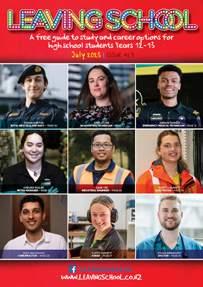
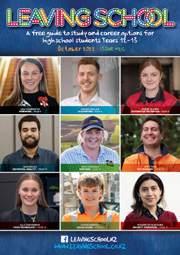
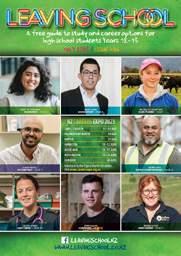
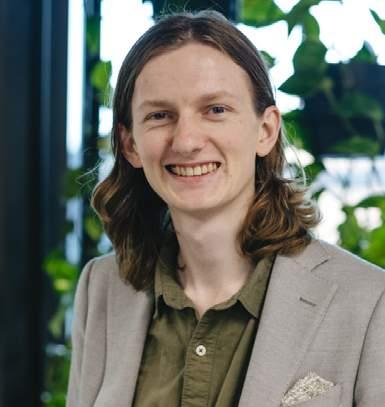
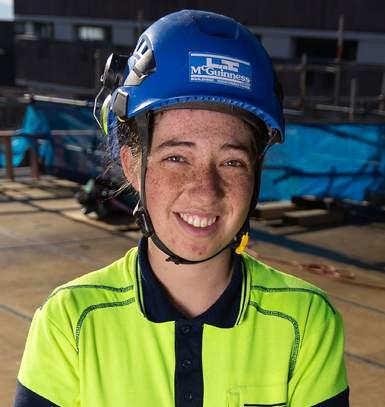
AND LOANS
If you are about to leave school and you’re looking at tertiary study, there’s going to be a lot to think about. If it’s anything to do with financial support while you’re studying, StudyLink can help and you need to apply by 16 December 2023.
Sign up for info at www.studylink.govt.nz

LIFELINE available 24/7 0800 543 354 www.lifeline.org.nz
YOUTHLINE available 24/7

0800 376 633 or free text 234 www.youthline.co.nz
WHAT’S UP
Mon–Fri noon–11pm & Sat/Sun 3pm–11pm



0800 942 8787 www.whatsup.co.nz



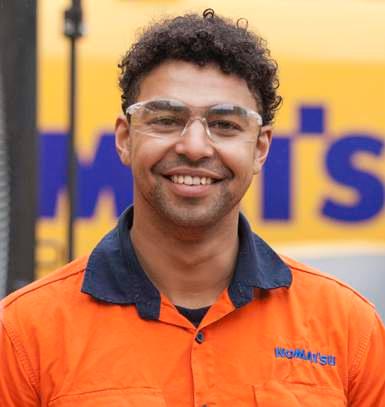


ALCOHOL DRUG HELPLINE























0800 787 797 available 24/7 www.alcoholdrughelp.org.nz




It’s always important to make sure that you are on the electoral roll and ready to take part in national and local elections. How else can you be sure that you are ready to have your say on the big issues affecting you and your family?
www.elections.org.nz/voters
LEAVING SCHOOL ISSUE #27 | LEAVINGSCHOOL.CO.NZ 25 IMPORTANT NOTICES
to disparage your ambitions. Small minds will always do that, but great minds will give you a feeling that you can become great too.
Mark Twain
It’s fine to celebrate success but it is more important to heed the lessons of failure.
Bill Gates
JORDAN SPAIN HEAVY AUTOMOTIVE ENGINEER – SEE PAGE
30
The beautiful thing about learning is that no one can take it away from you.
B.B. King
Read online at www.leavingschool.co.nz
RICHARD
LEE COUNTDOWN – SEE PAGE 32
GEORGIA STEVENSON BUILDER – SEE PAGE 27
POSITIVES AT EVERY TURN EMBARK ON A CAREER AT SEA

ROAN TAYLOR was 17 when he started work on a deep-sea fishing vessel with Sealord. He liked the idea of good amounts of time off between sailings and meeting new people. He had also heard that the money was pretty good. The information was from a good source – his parents, who’d both also worked on fishing crews.
“I love the physicality of the work,” says Roan, who joined Sealord’s freezer factory boat Aukaha. “It’s really rewarding – you feel good about doing hard work and then getting the time off. I also really enjoy the people you meet and the crew become like your sea family.”
His first sailing was a bit nerve-wracking, he says, but it didn’t take him long to settle in and begin to feel at home. To start with, he was based in the factory – learning to work with the machinery used to cut the fish and skin it – and helping stow the boxes of product in the freezer.
After a couple of trips, he became a deckhand. This is his current role and involves working outside on the boat, shooting and hauling the nets, mending them, driving the crane and forklift to load stores at port, and helping in the factory, when needed, to fillet and pack fish.
“The work is really varied,” he says. “A career at sea is definitely good if you want to learn lots of different skills.”
Before joining Sealord, Roan – who’s now 20 –had just begun Year 13 at Buller High School.
His subjects included Woodwork, Food Technology and Metal Work, so he knew his ideal job would involve practical, hands-on work.
As part of his training, he was supported by Sealord to attend Westport Deepsea Fishing School, where he’s gained his Advanced Deckhand Ticket.

“I found it a lot easier learning there compared to school because it was something I was a lot more focused on and I’m really interested in.”
On Aukaha, he generally works a roster of four weeks at sea, followed by the same amount of time at home, which is a great way to save money.
During Sealord’s busy hoki season, voyage lengths are shorter and there are also opportunities to earn more by doing double-up trips, where instead of returning home, crew members can opt to head back out to sea with another crew, and then return to sea again with their own crew straight afterwards.

This means extra payments for the trip on and trip off, in addition to normal pay, so the money can stack up quite quickly.

His trips have taken him mainly down the east and west coasts of the South Island, and sometimes the vessel fishes near the Chatham Islands.

“You get some real good views back to land, especially of the Southern Alps,” he says.
“We see whales and dolphins quite a bit and seals and birds too, it’s really cool.”


He recommends life at sea, saying, “It’s good if you want to learn discipline, and it’s quite good being able to get away from everything for a month at a time. It’s pretty good money too, especially considering you only work six months a year, it’s not too bad.”
There’s a good pathway for progression as well, he says. “I’d like to see myself as a first mate or skipper before I’m 40, but I’ll just see how that goes.”
LEAVINGSCHOOL.CO.NZ | LEAVING SCHOOL ISSUE #27
DEEP-SEA FISHER writer FIONA TERRY
photographer TIM CUFF
ROAN RECOMMENDS CAREER AT SEA FOR SCHOOL LEAVERS SAYING THAT THERE IS GOOD CAREER PROGRESSION, YOU EARN WELL AND THAT THE WORK IS REWARDING
ENJOYABLE
writer PETER WHITE photographer MARTY MELVILLE
BUILDING A BETTER FUTURE
Building apprentice GEORGIA STEVENSON loves being part of a special development in Wellington.
She is working on the Living Pā project, which is part of the redevelopment of the marae precinct at Victoria University of Wellington.
The Living Pā has been designed to be a purpose-built living lab and a place for multiple communities and disciplines to come together to discuss building a more equitable, fair and sustainable society. The project is regenerating five villas in front of Te Tumu Herenga Waka, the wharenui built more than 33 years ago. The construction uses timber alone and recycling is a high priority on site.
Georgia (20) says it is a cool development to be involved with.
“It is part of the Living Building Challenge, and it is like Green Star but way more involved. Everything has to be recycled properly. Most jobs we do, the construction is made of concrete and steel, but this is all timber. The columns, the beams, flooring – everything. “It is good to work with, but it can present issues. You don’t want to get the timber wet because that can cause swelling and expansion and things like that.”
Georgia began her apprenticeship with Wellington company L.T. McGuinness back in October 2021. She is about halfway through her apprenticeship, which was organised through BCITO |Te Pūkenga, the learning division for construction work at Te Pūkenga – New Zealand Institute of Skills and Technology.
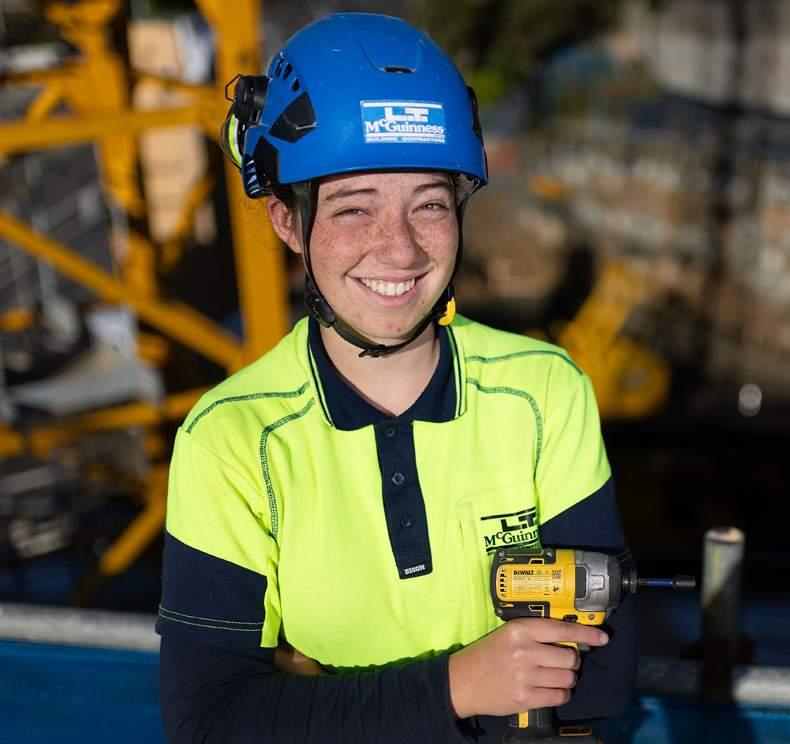
“It works well. The theory work is done online and there are a bunch of different unit standards that you slowly tick away at,” says Georgia. “Every four months, a training advisor visits you on-site and look over the work you have been doing. You explain the things you have worked on to them and they will sign you off when they believe you have a good understanding of it all.
“We also have an apprentice training school at L.T. McGuinness that apprentices attend twice a month for a full day to ensure we are keeping up with the BCITO programme. As well, we have mentors on our
site who are really helpful. Everyone in the company has been great and there is always someone willing to help out if you don’t know something.”





Georgia says to succeed in an apprenticeship, it comes down to hard work and having a good attitude.
“It can be quite challenging, which is always good, and there are always heaps of opportunities to learn. You need to actually be willing to try new things and work hard at it and keep going.”
Georgia went to Wellington Girls’ College and took PE, Maths and Statistics, English, plus Faith, Evidence and Reasoning in Year 13. She wanted to join the New Zealand Army, but her asthma stopped that plan. She started labouring and found she loved the building trade.
Georgia enjoys being one of the female apprentices working at L.T. McGuinness and she would like to see more females join her in the ranks but does not want any special treatment.
“I don’t try to be the female apprentice who wants to make a point of being a female. I just want to do exactly the same things the guys do.
“All the guys I work with treat me that way. I enjoy it and encourage more females [to begin].”
For more information on career opportunities with L.T. McGuinness, visit www.ltmcguinness.co.nz/careers/work-with-us
LEAVING SCHOOL ISSUE #27 | LEAVINGSCHOOL.CO.NZ
CHALLENGING
AND
you need to actually be wiLLing to try NEW THINGS AND WORK HARD AT IT AND KEEP GOING.
GEORGIA STEVENSON
AT
L.T. McGUINNESS, WHERE SHE HAS FOUND THAT HELP IS ALWAYS ON HAND.
BUILDER
LEARN TO CLEAR THE STRESS
JOIN THE CHIROPRACTIC COMMUNITY
“I get so much satisfaction from seeing people live their best life and able to do the things they love to do,” says DION ABAYAKOON.
“I see people of all ages with heaps of different things, including injuries and pain, as well as people who just don’t have the energy to do things. People can have low-energy levels coming back from being sick or just being so stressed with work.”
Dion (24) is an associate chiropractor with Cheyne and Sissons Chiropractic based in Porirua, Wellington. He joined the practice in July last year. He says chiropractic is all about clearing the stress out of your system so that your body can function as well as possible.
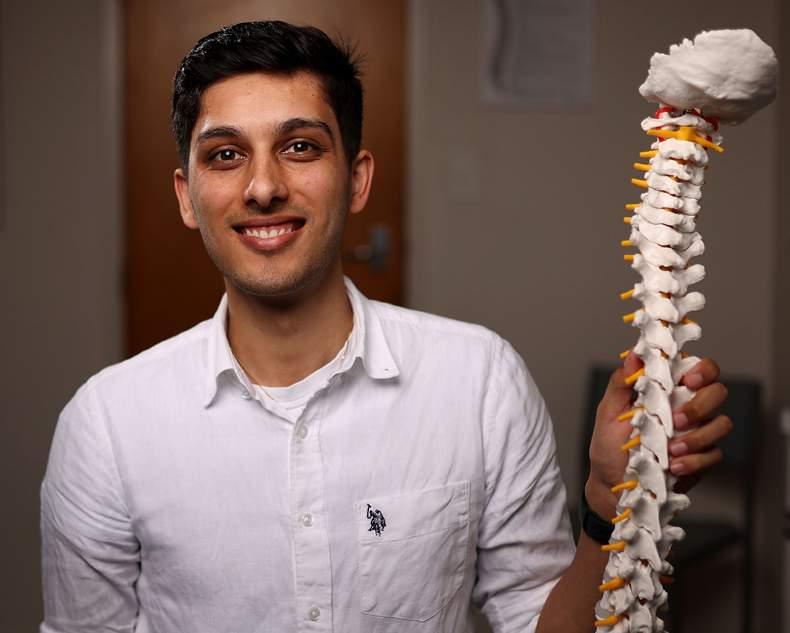
“I look at how your brain communicates with the rest of your body through your nervous system and how interruptions in that communication highway can affect different aspects of your life – like low back pain, neck pain and headaches to low energy and other things, like poor digestion.
“We do that by looking at the functions of the nervous system and looking at the strength of muscles, how well your motor functions work and



Launch Your Future

A school to work pathway can get you started in the exciting marine or composites industries and propel you towards an apprenticeship.

Get hands-on experience, learn practical skills and earn credits towards the completion of your NCEA qualifications. Don’t just imagine success — Launch it, School to Work!
Find out more at mastacademy.com
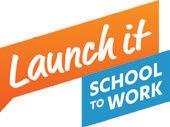
writer PETER WHITE // photographer MARTY MELVILLE
28 CHIROPRACTOR
your sensory system, as well as considering pain levels and symptomology.”
Dion says the chiropractic community is very close-knit as they like to stay in touch and have annual conferences to catch-up.
“We are always looking to up-skill and you meet people that are going to be friends for life because they are in the same community. My partner is also a chiropractor and we met while we were studying.”
Dion completed the one-year Diploma of Applied Science at Auckland University of Technology before he graduated from the esteemed New Zealand College of Chiropractic with a



Bachelor of Chiropractic, which took four years.

The college, based in Mt Wellington, Auckland, is regarded as having the best chiropractic research centre in the world.
“Initially the thing that stood out for me was that everybody kind of knows you – not just the other students but all the faculty as well. You are not just a student ID on a piece of paper, you are a name and a face. You get to be your own person.
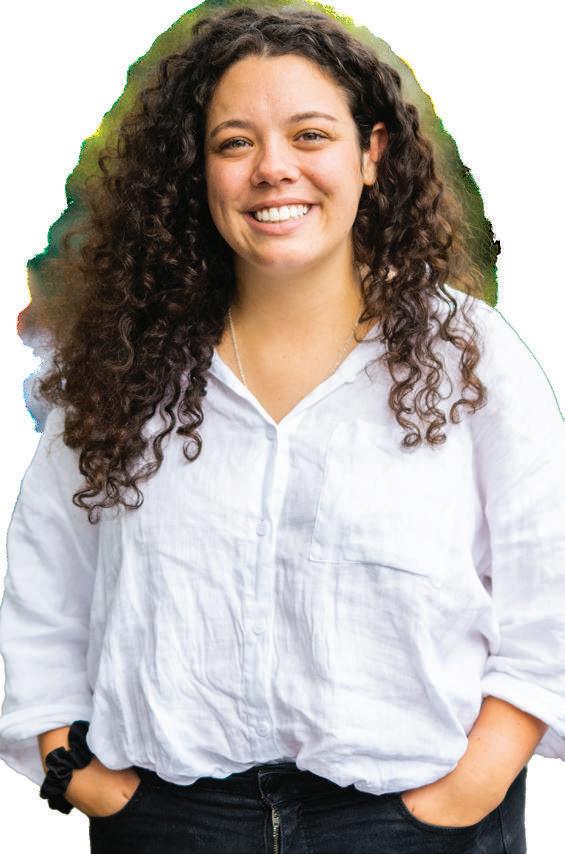
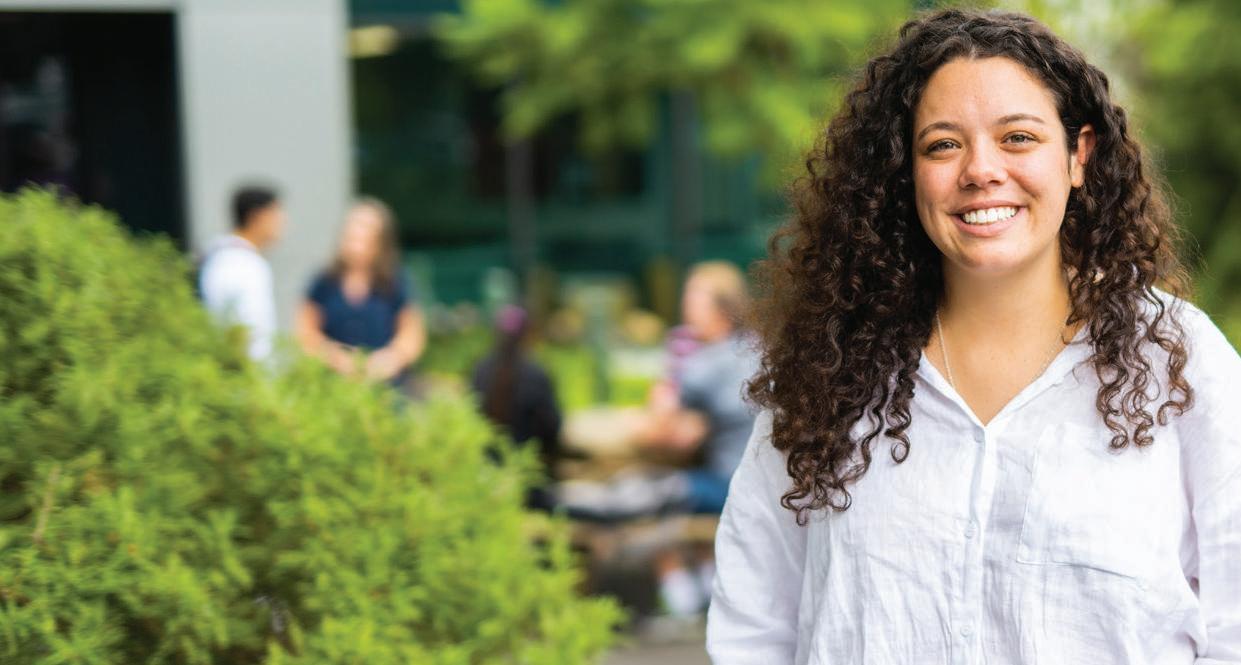
“It is a very hands-on course, so you don’t spend your first few years just with your head in books. You get to actually go out and meet people, to put your hands on spines and learn some



business skills. You get to build the skills to run a good chiropractic practice.”
Dion attended Whangaparāoa College in Auckland. In Year 13, he studied PE, Business Studies, Calculus, Physics and Geography.
It was attending the College’s open day during his final high-school year that convinced him to go down the chiropractic path. For school leavers, he says there are excellent career prospects for the future.
“We need a lot more chiropractors in the industry here in New Zealand. You can also travel around the world and do well, as in my view we have the top college in the world for chiropractic.”
IN YEAR 13 29 29 Looking for a rewarding, hands-on career in health? Chiropractic is a natural approach to health and wellbeing which focuses on care of the spine and nervous system. Scan QR code for more details or visit chiropractic.ac.nz/discover Discover how you can make a positive impact in the lives of others through a hands-on and holistic approach to health and wellbeing. JOIN US AT OUR OPEN DAY Saturday 7th October, 12.30 - 3pm New Zealand College of Chiropractic 6 Harrison Road, Mount Wellington, Auckland
DION ABAYAKOON of Technology diploma-in-applied-science CHIROPRACTOR
I LOOK AT HOW YOUR BRAIN COMMUNICATES WITH THE REST OF your body through your nervous system and hOW INTERRUPTIONS IN THAT COMMUNICATION HIGHWAY CAN AFFECT DIFFERENT ASPECTS OF YOUR LIFE
TRAVEL WITH YOUR TRADE
writer PETER WHITE // photographer DEAN NORRIE
JORDAN SPAIN spent many years chasing his dream of becoming an international footballer with the All Whites.
But after playing for New Zealand from under-17 to under-23 level, and just missing out on a place in the Olympic Games squad, he decided it was time to find a long-term career.
“I decided I wanted more than just a job. I wanted a career where you can progress up to being more than just a worker,” says Jordan.
Now the 23-year-old is in his first year of a four-year apprenticeship with Christchurch-based multinational company Komatsu. He will qualify with a New Zealand Certificate in Heavy Automotive Engineering (Level 4).
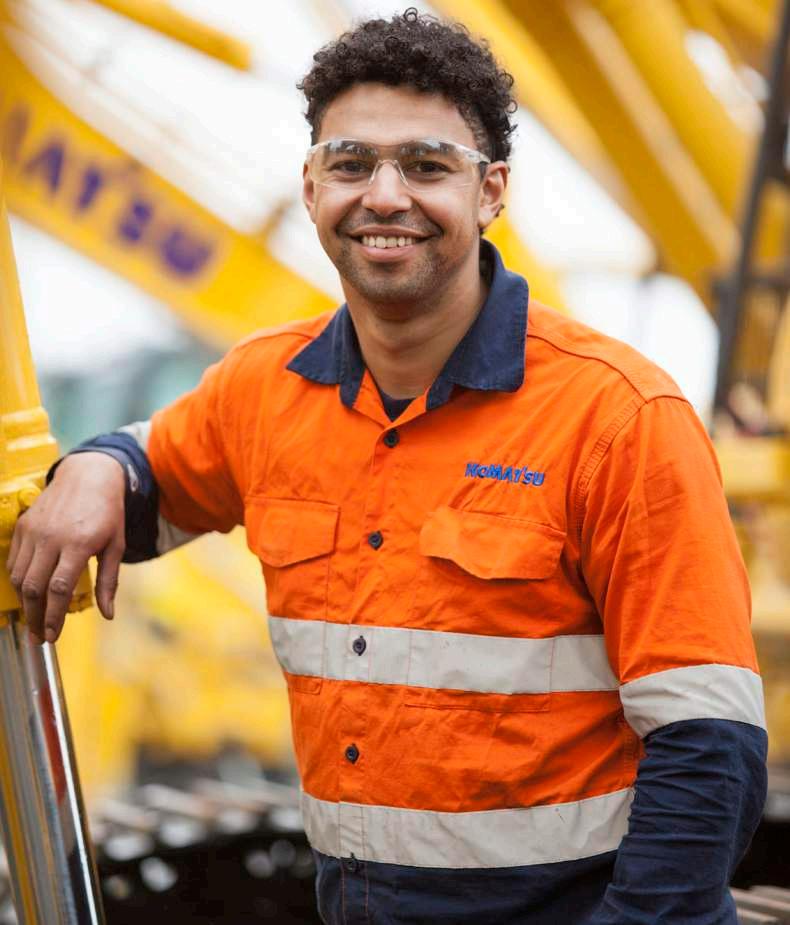
Jordan is loving the variety of the work, including fixing some of the biggest machinery – like diggers, dump trucks, graders and bulldozers.
“I couldn’t be happier. It is a lot more technical than what you might think on the outside. We have massive 30-tonne machines that are now running on hybrid engines, which is pretty cool – that technical side is what I probably enjoy the most.
“There is a great bunch of people here at Komatsu. From day one, it was pretty easy to just step in and get into work as everyone is quite nurturing. You are never afraid to ask questions. I just like the environment that we have here.
“It is always constant learning, which is good, and you don’t get bored.”

Being organised is the biggest asset to have as an apprentice. Jordan says you have to balance your work during the day with the after-hours work.
“That is an extra few hours a week. MITO is where we get our credits from for the work we do here, like you would with NCEA. We also have theory assessments to complete with them. MITO are good to work with and check in with you quite regularly.
“On top of that, there is the company standard, online work we have to do as well, which is quite helpful. It goes into more depth about our machinery specifically, learning about things like our hydraulic systems.

“So keeping on top of everything has been the biggest challenge.”
Jordan says Komatsu offers so much to help you become a qualified tradesperson.
“We have already been to Australia this year for training and they will send us off again. They just put so much time and effort into us. When you are qualified, there are more opportunities within the company to explore.”
Jordan grew up in Christchurch and attended Cashmere High School until Year 12. In Year 13, he got a football scholarship to St Kentigern College in
Auckland. There he studied English, Physics, Statistics, Media Design and Architectural Design, before chasing his football dream.
He thinks it is a good time for school leavers to consider getting an apprenticeship.
“I look back and think, ‘Why didn’t I do this straight out of high school?’ If you get qualified with a big company like Komatsu, you can travel anywhere around the world.

“The younger you get into it the better.”
■ JORDAN SPAIN IS COMPLETING A FOUR-YEAR APPRENTICESHIP WITH KOMATSU HE WILL QUALIFY WITH A NEW ZEALAND CERTIFICATE IN HEAVY AUTOMOTIVE ENGINEERING (LEVEL 4)
■ HE STUDIED ENGLISH, PHYSICS, CALCULUS, STATISTICS, MEDIA DESIGN AND ARCHITECTURAL DESIGN IN YEAR 13
■ JORDAN RECOMMENDS GETTING QUALIFIED WITH A BIG COMPANY LIKE KOMATSU AND SAYS THERE ARE WORK OPPORTUNITIES OVERSEAS
For more information on the Komatsu apprenticeship programme, visit https://www.komatsu.co.nz/careers/ apprentice-program
For more information on starting an apprenticeship with MITO | Te Pūkenga, visit www.mito.org.nz


LEAVINGSCHOOL.CO.NZ | LEAVING SCHOOL ISSUE #27 HEAVY AUTOMOTIVE ENGINEERING
BIG MACHINERY, BIG FUTURE
FROM DAY one, it was pretty easy to JUST STEP IN AND GET INTO WORK AS EVERYONE IS QUITE NURTURING. you are never afraid TO ASK QUESTIONS.
30
JORDAN SPAIN
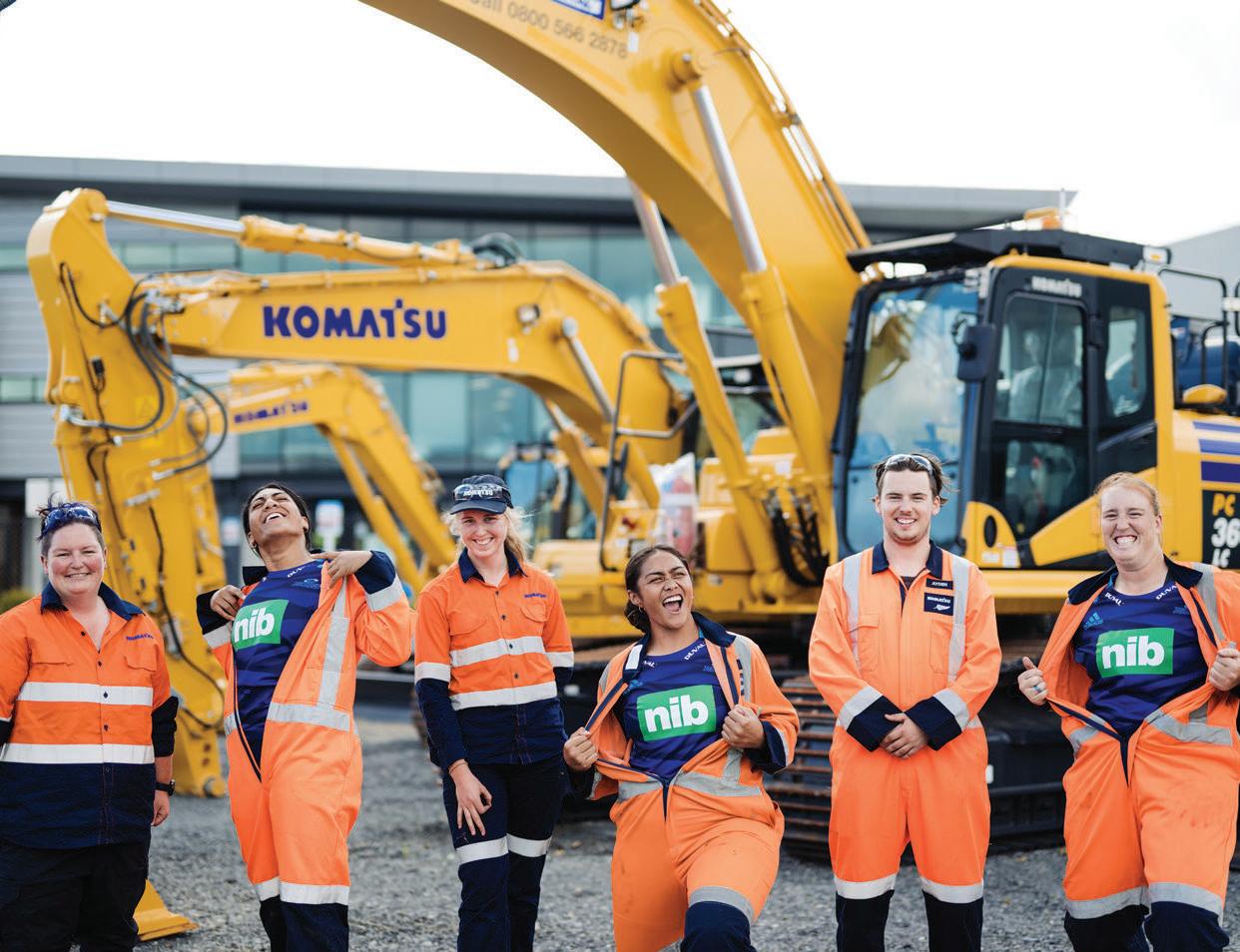

Komatsu Apprentice Program https://www.komatsu.co.nz/company/careers-with-komatsu/apprentice-program Creating value together Obtain valuable skills and receive nationally recognised job qualifications with a leading global organisation – all while earning an income. Register your interest today! 0800 566 2878 | komatsu.co.nz
LAST MINUTE LOGISTICS
ENHANCEMENT OF EXPERIENCE



There is so much more to working for supermarket chain Countdown than what you see in store.
Behind the scenes are a myriad of specialists whose efforts enable the logistics and distribution arms of the organisation to work efficiently.
RICHARD LEE is part of a new generation of university graduates who began their careers with the Countdown graduate programme. Richard joined Countdown in February 2019 and is based at their digital office in Ponsonby, Auckland.
He has just completed one year as the lead for the eCommerce Logistics Routing and Optimisation team.
“I was leading the team as they sharpen up our logistics network and make it easier for drivers to be en route on time. It was about setting the roadmap and developing the culture to achieve our team’s mission of getting your groceries to you,
where you want and when you want,” says Richard.
Richard (25) has just begun a new role with Countdown as the Product Manager for Delivery Experience.
“What we do is we listen to customers around how they feel their delivery experiences went and try and make technological enhancements to that experience.
“That can be anything from improving our transport management system or building on different parts of a customer’s experience, for example the accuracy of delivery estimates.”

What Richard loves most about his role is the opportunity for innovation.
“When it comes to problem solving, there is no set path. It is about understanding customers and understanding what kind of value we can make and then figuring out what we need to do from there.
Find a career that will send you new places.
“There really is a lot of opportunity for creativity and innovation, which I really enjoy.”
Richard attended King’s College in Auckland where he took Maths, English, History and Spanish in Year 13.
He then completed a Bachelor of Commerce majoring in Marketing and Information Systems at the University of Auckland, graduating in 2018.

He was one of 12 graduates taken on by Countdown in their 2019 graduate programme. Richard was in the digital stream, focusing on the online side of the business.
“I didn’t know anything about the world of logistics until I started the graduate programme. I came in with a marketing background and mindset.
“The idea of being able to try something new and challenge
myself in a different way was really appealing about the grad programme. I did rotations within teams across multiple parts of the business for about six months and then thought, ‘Yes, this is what I want to do’.
“It is a massively growing area of the business right now, that delivery-to-consumer or last mile experience, especially as customers go and opt for more and more kind of convenience experiences.”
Richard’s advice to school leavers is that you never quite know what you will or won’t enjoy until you give it a go.
“Don’t count things out because you think it may be boring.
“It is by exposing yourself to those challenges and new experiences that you get the opportunity to discover something that you really enjoy.”
e COMMERCE
writer PETER WHITE // photographer LOGAN WEST
Check out our careers site to see current
a
find out
about working for
jobs.nzpost.co.nz
opportunities, get
feel for what we can o er you, and
all
NZ Post.
KEY FACTS

■ RICHARD LEE HAS A BACHELOR OF COMMERCE MAJORING IN MARKETING AND INFORMATION SYSTEMS FROM THE UNIVERSITY OF AUCKLAND
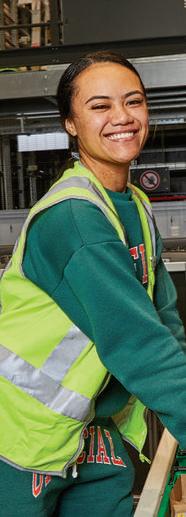
■ HE WORKS AT COUNTDOWN AS A PRODUCT MANAGER FOR DELIVERY EXPERIENCE, HAVING RECENTLY FINISHED UP AS THE TEAM LEAD FOR eCOMMERCE LOGISTICS ROUTING AND OPTIMISATION

■ RICHARD STARTED HIS CAREER AT COUNTDOWN IN THEIR GRADUATE PROGRAMME, WHERE HE COMPLETED ROTATIONS IN TEAMS ACROSS MULTIPLE PARTS OF THE BUSINESS.

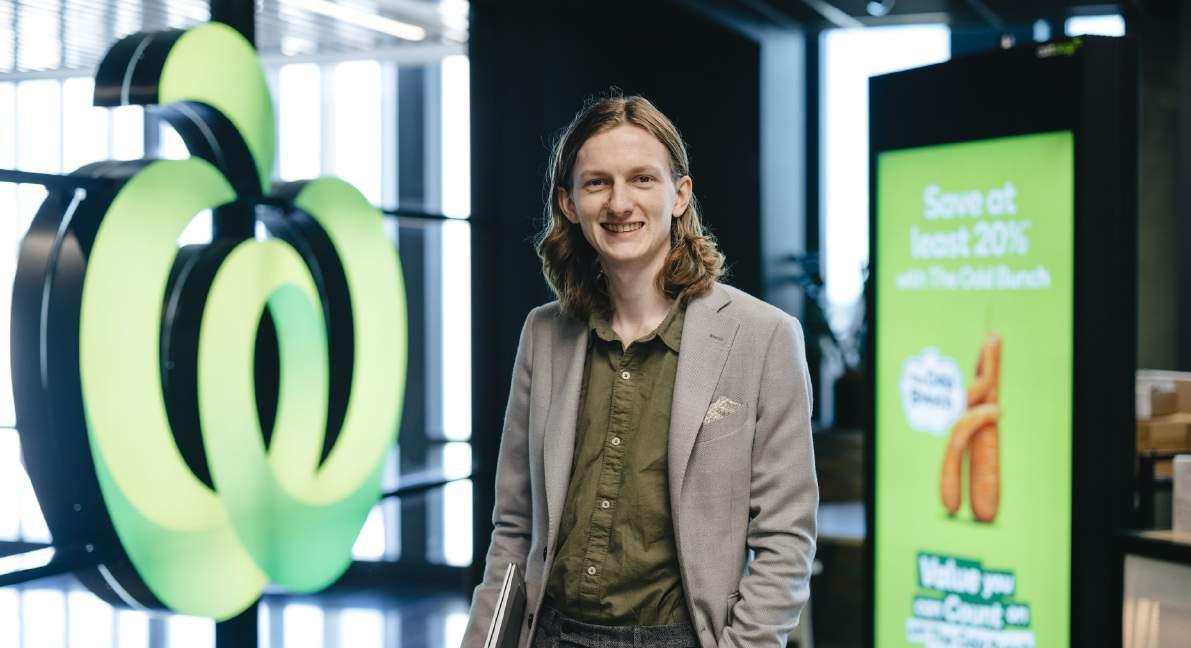
LEAVING SCHOOL AND NEED A


JOB?

We provide a friendly and down-to-earth workplace that’s inclusive and supportive, where we work hard and love what we do.

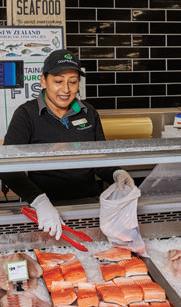
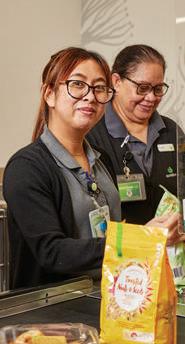



There are a variety of roles available throughout New Zealand with something for everyone. Scan the QR code, drop off your CV or email it to careers@countdown.co.nz to apply.

We’re committed to having equal opportunities for all.
Come as you are | Haere mai rā


e COMMERCE
33
when it comes to problem SOLVING , THERE IS NO SET path . IT IS ABOUT understanding CUSTOMERS AND understanding WHAT KIND OF VALUE WE CAN MAKE .
RICHARD LEE
HELPING WITH ORAL HEALTH
CHARLOTTE LEABOURN is part of a new wave of dentists bringing a more positive image to the profession.
“I think, unfortunately, for a lot of the older generation they don’t have a positive view of it but as the younger ones are coming through there has been a lot of changes there. I think it has been getting better and thankfully lots less people are scared of the dentist,” says Charlotte.
“The attitude is definitely shifting a bit, which is good. It is nicer to go to the dentist now than it used to be.”
Charlotte has been working for Fraser Dental in Hobsonville, Auckland for nine months. The 26-year-old dentist was working in Rotorua for two-and-a-half years prior to that.
Helping people is the basis of what Charlotte loves most about being a dentist.
It is what got her into the health profession in the first place.
“It is also a practical job. It is really hands-on and quite challenging as every day there are new people that come in. There is always lots to learn and so it is quite good for my brain as well, which is important to me.”
Charlotte does dental check-ups plus restorative work, which includes fillings, caps and crowns on teeth and removal of teeth, plus root canal procedures to remove the nerves of a tooth to fix infections.
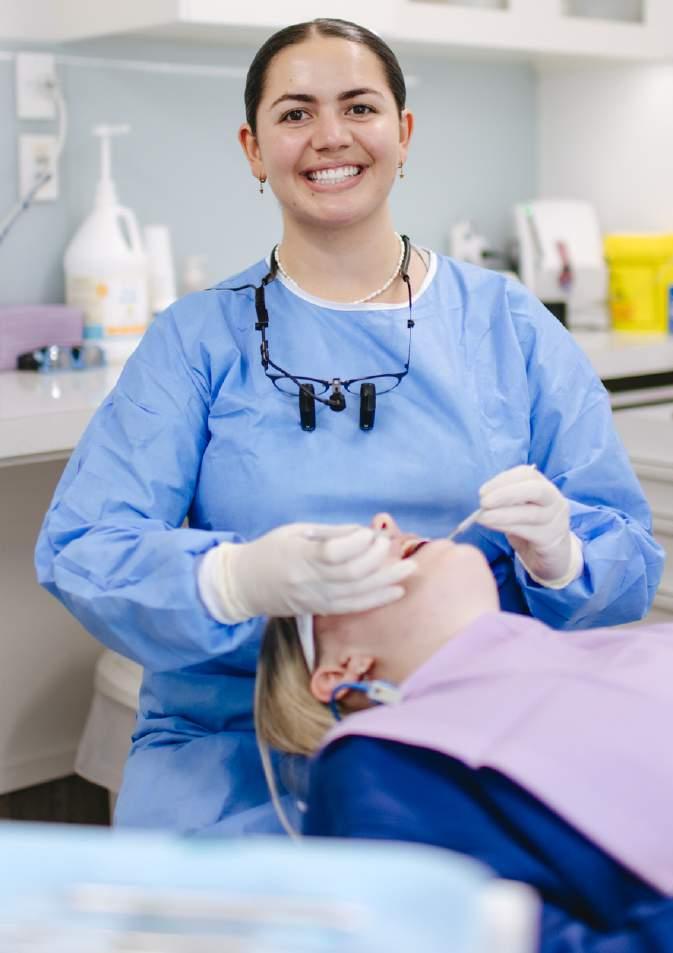
“What I do is bread-and-butter dentistry. I am a general dentist, but I also do a bit of Invisalign. Instead of braces, you use clear aligners to straighten the teeth.” Building good rapport with her patients and listening is a big part of her role as a dentist.
“You need to understand that lots of people are not happy to be there so you have got to be really understanding and patient with them while they kind of work through things.
“It is about being a nice person they can chat away with, especially as I am a young female and people are used to going to see men to have their dental treatment done.
“I think people find that quite refreshing at times, which is nice.”
Charlotte says getting the message across to young people about oral hygiene and looking after your teeth still needs work.
“There are always going to be people who are more aware of it and more educated but there definitely needs to be a lot more education about oral health in general.”
The only place to study for a Bachelor of Dental Surgery in New Zealand is at the University of Otago. Charlotte was there from 2015 until 2019, first doing a year of health science before moving into the dentistry course.
She attended Glendowie College in Auckland where she took English, Economics, Chemistry, Biology and Physics in Year 13.
Charlotte says dentistry is a great industry to consider for a career. To learn more about being a dentist, she recommends asking your dentist to shadow them for a day and watch what they do or talking to current dentistry students.
KEY FACTS

■ CHARLOTTE LEABOURN HAS A BACHELOR OF DENTAL SURGERY FROM THE UNIVERSITY OF OTAGO




■ SHE WORKS AT FRASER DENTAL IN HOBSONVILLE, WHERE SHE MAINLY PERFORMS GENERAL DENTISTRY BUT ALSO DOES INVISALIGN
■ CHARLOTTE STUDIED ENGLISH, ECONOMICS, CHEMISTRY, BIOLOGY AND PHYSICS IN YEAR 13
For more information on studying dentistry at the University of Otago, visit www.otago.ac.nz/dentistry

THERE IS ALWAYS LOTS TO LEARN AND SO IT IS QUITE GOOD FOR MY BRAIN AS WELL, WHICH IS IMPORTANT TO ME
34 DENTIST
CHARLOTTE LEABOURN
SINK YOUR
TEETH INTO DENTISTRY
LEAVINGSCHOOL.CO.NZ | LEAVING SCHOOL ISSUE #27 writer PETER WHITE photography LOGAN WEST
PASSION FOR MEDICINE REWARDING WORK WITH PATIENTS
ETHAN BREINHORST has been working as a house officer (junior doctor) at Auckland City Hospital for six months, after having spent one year working at North Shore Hospital. He is on the first step of progressing through training to eventually becoming a specialist.
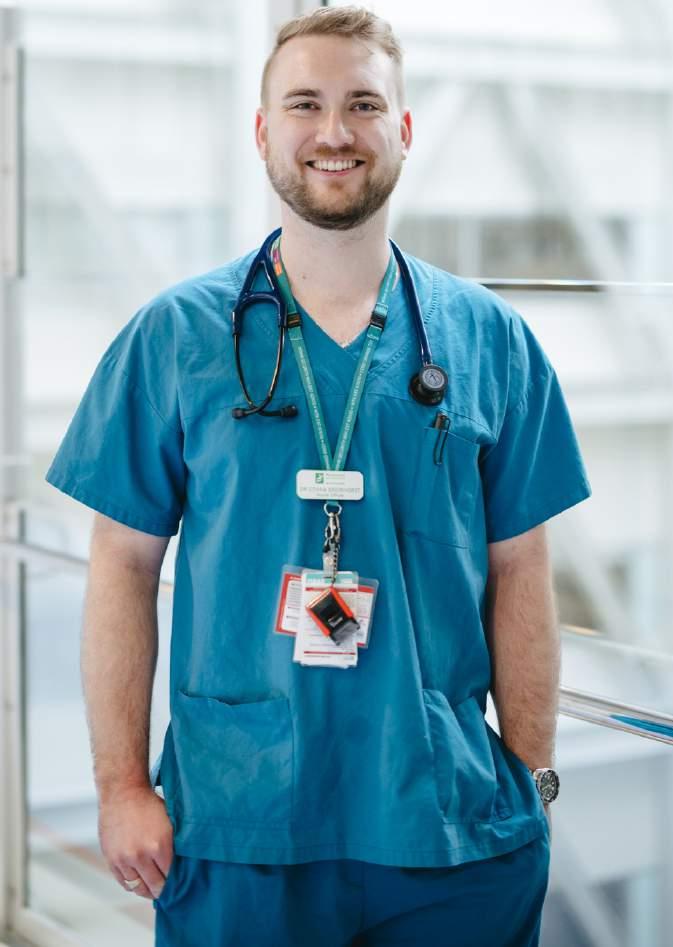
“What that means as a house officer is, basically, I am in charge of making sure the day-to-day investigations and jobs for patients that senior clinicians want get done,” says Ethan (26).
“So that is requesting scans and following them up, and doing blood tests or minor procedures if I need to. Then if someone has reached the stage where they can go home, I complete all the discharge paperwork and make sure their clinical notes are up-to-date.”
House officers rotate every three months to different wards in the hospital is to ensure they get broad experience in lots of different specialties.
“After two years, we can step up to become a registrar, which is the next step of seniority and experience.”
What Ethan loves about being a house officer is the one-on-one contact he gets with the patients.
“That is even more so with the family and the patient together. When all those decisions and procedures or treatments have come together, where the patient is feeling so much better and the family are making all these plans to get them home – I think that is one of the most rewarding things.”
Ethan has just interviewed to join the radiology programme and eventually become a clinical radiologist. His aim is to continue a high degree of scholarship, and personal and professional development.
Ethan completed his Bachelor of Medicine and Bachelor of Surgery (MBChB) and Bachelor of Medical Science (Honours) (BMedSci) at the University of Auckland. His research thesis was on paediatric musculoskeletal architecture and was part of a partnership between the University of Toronto and the University of Auckland.
“I basically took a gap year. After the three pre-clinical years of my degree, which is essentially lectures, then you do three years at the hospital rotating around. At any point between those last three years, you can take a break from the clinical work and do a year of research.
KEY FACTS
writer PETER WHITE photography LOGAN WEST
I AM IN CHARGE OF MAKING SURE THE DAY-to - DAY INVESTIGATIONS AND JOBS FOR PATIENTS THAT SENIOR CLINICIANS WANT GET DONE.
ETHAN BREINHORST


“It was a really good year to get a chance to learn how to do some research but also to present it at some conferences, publish some articles if you want and you also get an extra degree from it.

“In more competitive specialties, it really shows you have that extra desire to do learning and research.”
Ethan went to Rosmini College on Auckland’s North Shore. In Year 13, he took English, Calculus,


■ ETHAN BREINHORST HAS A BACHELOR OF MEDICINE AND BACHELOR OF SURGERY, AND A BACHELOR OF MEDICAL SCIENCE (HONOURS) FROM THE UNIVERSITY OF AUCKLAND
■ HE WORKS AT AUCKLAND CITY HOSPITAL AS A HOUSE OFFICER (JUNIOR DOCTOR)

■ ETHAN STUDIED ENGLISH, CALCULUS, PHYSICS, CHEMISTRY AND BIOLOGY IN YEAR 13 AND SAT CORRESPONDING SCHOLARSHIP EXAMS
Physics, Chemistry and Biology, plus he also sat corresponding scholarship exams. His advice to students is to ensure they have the passion to do medicine.
“That is probably one of the most important things because it is not an easy road and it does not necessarily get any easier as a junior doctor. That passion is what will give you the drive to push through those late hours or to do some extra learning.”
For more information on studying medicine at the University of Auckland, visit www.auckland.ac.nz/medicine
35 MEDICINE LEAVING SCHOOL ISSUE #27 | LEAVINGSCHOOL.CO.NZ
ENGINEERING AT SEA AMAZING OPPORTUNITIES ON OFFER
 writer PETER WHITE photographer CORPORAL SEAN SPIVEY
writer PETER WHITE photographer CORPORAL SEAN SPIVEY
“It has been such an amazing experience so far. The Royal New Zealand Navy has a lot of opportunities to travel overseas, so that was a big thing for me choosing them,” says JESSICA LAYBURN . Jessica (21) is in her fourth and final year of a Bachelor of Mechanical Engineering at the University of Canterbury and is set to graduate in November.
She is grateful to be part of the Chatham Scholarship Scheme, a bursary engineering scholarship offered by the Royal New Zealand Navy (RNZN).

“The Navy pays for my tuition fees and give me a $9000 allowance on top of that. It is quite relaxed and enables me to study here in Canterbury rather than having to go to Auckland or Massey on the Tangaroa Scholarship Scheme.”
Jessica began the application process halfway through her final year at Onslow College in Wellington.
“It took about a year, so I was actually in my first year of engineering at Canterbury by the time I got into the Navy.

In that first year, I did three weeks of officer training, which was basically fitness and leadership activities and general Navy knowledge. It was held up at the Devonport Naval Base in Auckland.”
What Jessica loves most about her degree are the practical elements involved.
“Every year since the second year, we have had a design course where we get to put together all our knowledge about the theory we have learnt and then design our own things on computers. So, it is quite cool,” she says.

When Jessica graduates, she will do six months of junior officer common training. Then she will complete either the Systems Engineering and Management Course (SEMC) at the Royal Naval School of Marine Engineering in Portsmouth, United

Kingdom or the Marine Engineering Application Course at the Royal Australian Navy’s Engineering Training Facility in Melbourne, Australia.
“It is basically teaching you engineering specific to naval ships and after that, you get posted on a ship. It is very hands-on repairing things on ship, so you know later on how to manage people to do those things.”

Jessica is obligated to serve in the Navy for at least three-and-a-half years as part of her return of service under the Chatham Scholarship Scheme. Her long-term goal is to become a Naval Lieutenant.
Being shown through the Navy’s flagship new vessel HMNZS Aotearoa was an eye-opener for Jessica. The 26,000-tonne tanker and replenishment ship is the largest the RNZN has ever operated.
“When I was doing the selection board to get into the Navy, they showed us Aotearoa and that was incredible. There was so much space and all the technology was so new.”
In Year 13 at Onslow College, Jessica studied Biology, Physics, Chemistry, Maths and Economics. Seeing a poster on the school noticeboard for the Air Force’s School to Skies course triggered her interest in the Defence Force.
“You stay on their base for a week and it is all just for women as well. We got to do a whole bunch of engineering and technical activities which were fun and that is what got me interested in the military.”
KEY FACTS

LEAVINGSCHOOL.CO.NZ | LEAVING SCHOOL ISSUE #27 ROYAL NEW ZEALAND NAVY
36
A
OF SERVICE
■ JESSICA IS OBLIGATED TO SERVE IN THE NAVY FOR AT LEAST THREE-AND-A-HALF YEARS AS
RETURN
UNDER THE CHATHAM SCHEME
WHEN I WAS DOING THE SELECTION BOARD to GET INTo the NAVY, they showed us AOTEAROA AND THAT WAS INCREDIBLE.
JESSICA LAYBURN
SHOWCASE YOUR CREATIVITY OPPORTUNITIES IN HAIRDRESSING
writer PETER WHITE photographer LOGAN WEST
Making people look and feel fabulous is what NEWTON COOK loves most about working in the hairdressing industry.
Newton (31) is the education and creative director for Rodney Wayne and is based in Auckland.

“I lead our national artistic team to create our annual campaigns and I’m in charge of coordinating the education of our teams nationwide. I work with our partners to make sure our teams are well trained and up-skilled in everything they need to know,” says Newton.
“Sometimes, I also work with fashion magazines and do photo shoots for their quarterly releases.”
There is a shortage of young people starting apprenticeships in the hair industry currently. Newton says there are great opportunities to begin a career with Rodney Wayne.
“We all start at the same level. With the Rodney Wayne system, we have a structure or a pathway that you follow to get to a position like me or a regional position within the brand.”
Young people begin an apprenticeship through HITO (New Zealand Hair and Beauty Industry Training Organisation). Once a week, apprentices have sessions with HITO or a training academy to go through the unit standards.
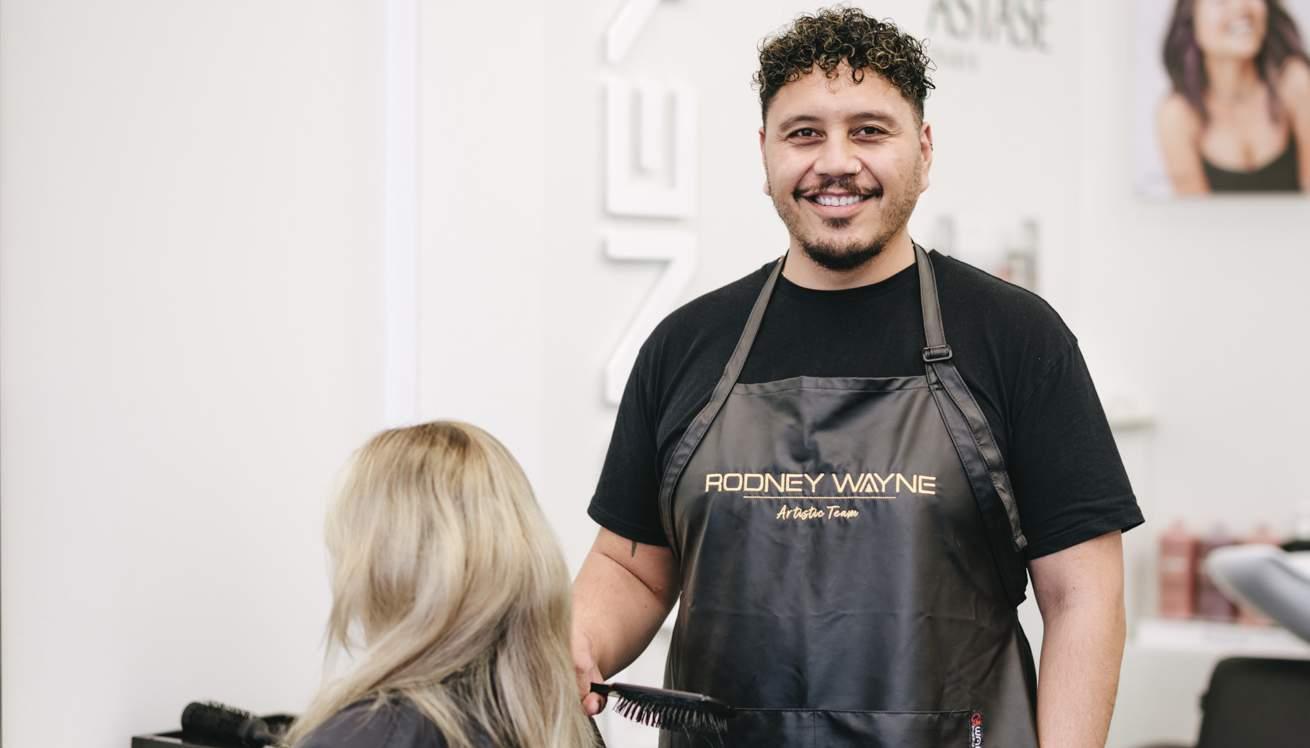

“In the salon, we would support them to train them in whatever unit standard they are up to and also making sure they are keeping up with whatever was relevant consumer-wise within the salon.”


Newton attended Western Springs College in Auckland. He loved his time there and is proud to have been a school leader. In Year 13, he took creative subjects he really enjoyed like Music, Dance, Performing Arts, along with English, PE and Maths. He says what Rodney Wayne is looking for from school leavers is a great attitude and being willing and open to learn.

“When you come into the salon, we teach you all the skills and give you all the tools that you need to succeed, but if you don’t have a good attitude then sometimes it is harder to get to where you need to be or where you want to be.
■ NEWTON COOK IS THE EDUCATION AND CREATIVE DIRECTOR AT RODNEY WAYNE AND IS BASED IN AUCKLAND
■ HE SAYS THERE IS A SHORTAGE OF YOUNG PEOPLE STARTING APPRENTICESHIPS IN THE HAIR INDUSTRY, WHICH ARE COMPLETED THROUGH HITO
■ NEWTON RECOMMENDS THE HAIR INDUSTRY SAYING THERE ARE MANY ROLE OPTIONS, A LOT OF VARIETY AND OPPORTUNITIES, AND A STRUCTURED CAREER PATHWAY TO FOLLOW AT RODNEY WAYNE
“We will teach you everything you need to know hairdressing-wise. We offer courses with outside providers like EMA to teach [apprentices] how to communicate with different types of people. We take care of that sort of stuff, but you have to have a great attitude.”
Newton says the hair industry is a really good industry to get involved in and offers so many different career options.
“The great thing about hairdressing is you can do it from anywhere. Everyone needs their hair cut and there are a lot of people who want their hair coloured. It is definitely not a dying industry that a robot could come in and take over!
“It is always interesting because you are meeting different people and it has a lot of variety as there are lots of opportunities. You could decide to just work in a salon or go ahead into the more creative industry and work on film sets, TV sets or be a creative stylist at fashion week.”
LEAVING SCHOOL ISSUE #27 | LEAVINGSCHOOL.CO.NZ
HAIRDRESSING
WITH THE RODNEY WAYNE SYSTEM , we have a STRUCTURE OR A PATHWAY thAT YOU FOLLOW TO GET TO A POSITION LIKE ME OR A REGIONAL POSITION WITHIN THE BRAND
NEWTON COOK
KEEN TO LEAD SUCCESSFUL PLUMBING PATHWAY
writer PETER WHITE photographer LOGAN WEST
It was a night that Auckland-based apprentice SEBASTIAN SEKENE is not likely to ever forget.
Recently, the 22-year-old won a Plumbing World Scholarship and was named Overall Scholarship Winner at the 2023 New Zealand Plumbing Awards held in Christchurch.
Sebastian, who is in the fourth year of his five-year apprenticeship with Heron Plumbing, says it was definitely pretty cool to win but it has not changed him.
“To be honest, I have come back to work since winning the award and am back doing the same things. I won’t be getting a fat ego boost or anything, but I am proud and my mum is too.”
Sebastian says winning a Masterlink Outward Bound Scholarship in 2022 was the turning point for him that helped him win the awards. He spent 16 days at Anakiwa with other construction industry apprentices on a building leaders course.
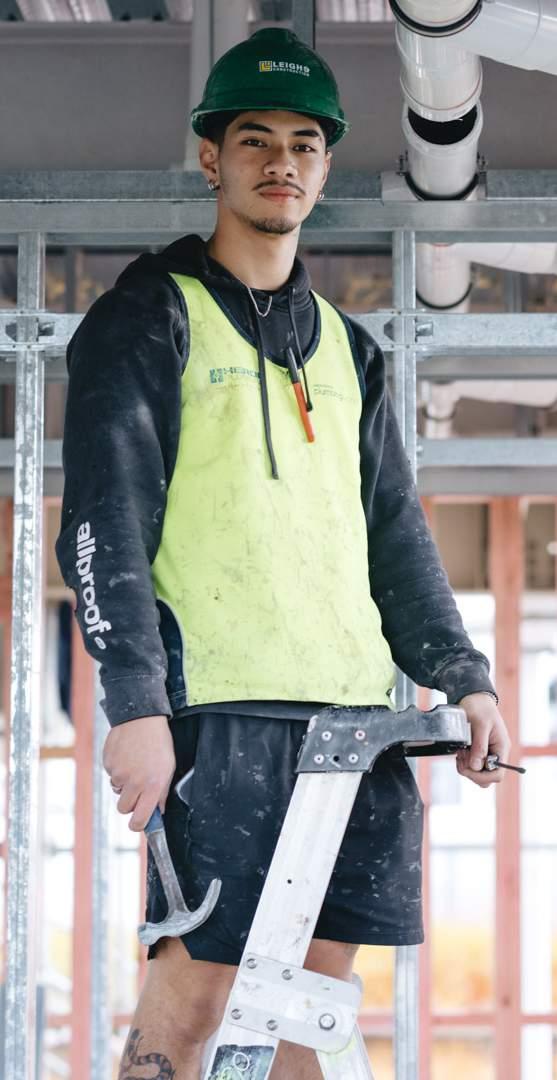
He says it was the best thing he’s ever done. It really opened his eyes to what kind of person and leader he wants to be in the industry.
“Apparently, I came back more mature and with a lot more growth and that sort of thing. I thought I was mature before I went!

“After that course, I did have a change of mindset in the way I viewed things and what sort of leader I wanted to be.
“I started putting my hand up more for more responsibility at work and to handle my own jobs. I guess that’s where the Outward Bound course helped get me the award. I’ve been telling all the apprentices in my job to apply for it, as you have nothing to lose and so much to gain.”

What Sebastian likes most about his job is the repetition of doing the same sort of job over and over.
“That’s how I learn. I can’t do one thing only once and have it set in my brain. I also like the variety of jobs that we do. I could go from doing water pipe outs for a week and then come back to drainage work.
“It is completely different. It is good to have lots of knowledge under my belt so when I do go out to jobs I am not familiar with, I can figure it out from all the other experience I have had from other jobs.”
Since October 2022, Sebastian has contributed a bi-monthly column to NZ Plumber magazine where he shares what it’s like to be an apprentice and what he loves about plumbing.

At Manurewa High School, Sebastian liked Outdoor Education and PE most of all, but he was not sure what he wanted to do when he left school.
It was after talking to the school’s careers advisor he signed up to do a pre-trade course at the Manukau Institute of Technology (MIT). He then landed his plumbing, gasfitting and drainlaying apprenticeship through Masterlink at Heron Plumbing.
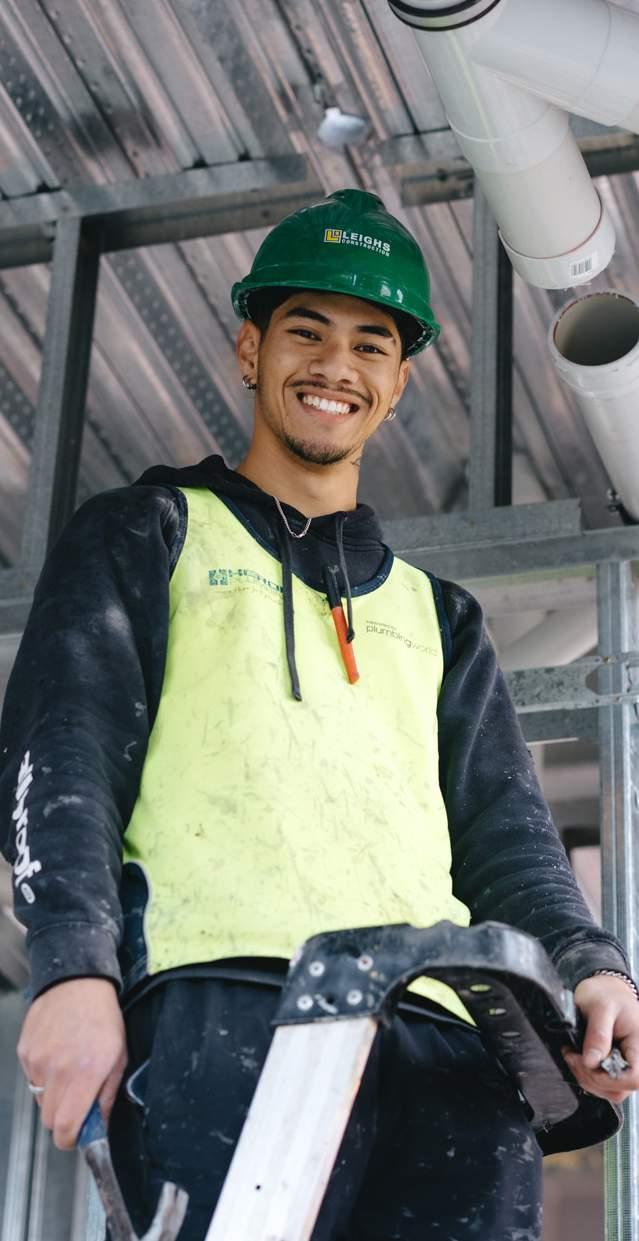
“Without the pre-trade, I probably wouldn’t be where I am now.”


LEAVINGSCHOOL.CO.NZ | LEAVING SCHOOL ISSUE #27 38 WITH OTHER CONSTRUCTION INDUSTRY APPRENTICES PLUMBING, GASFITTING AND DRAINLAYING
I ALSO LIKE THE VARIETY OF jobs we do . I COULD GO FROM DOING WATER PIPE OUTS FOR A WEEK AND THEN COME BACK TO DRAINAGE work.
SEBASTIAN SEKENE
GOING TO FUND YOUR STUDY?
STUDYLINK IS HERE TO HELP WHO’S
What do a genie, Santa and a billionaire’s chihuahua have in common? They’re not going to help fund your study!
But STUDYLINK can.
StudyLink is a government agency that can help you pay for study with Student Allowances and Loans.
Check out their website – studylink.govt.nz
– to find out about the support you can get, how to apply for it and manage it online.
These are the main payments you can get to help you pay for your study:
FEES-FREE STUDY
A payment to cover your first year of course fees. You don’t need to pay it back. You may be able to get it as a New Zealander leaving school soon and studying or training for the first time next year.
To check, go to feesfree.govt.nz
Even if you get fees-free study for the first year, you may still need help with course costs or living expenses.
STUDENT ALLOWANCE
This is a weekly payment to help with living expenses – you don’t have to pay it back. How much you get depends on:
– your income
– your living situation
– your parents’ income (if you’re under 24).


STUDENT LOAN
The Student Loan can help with study costs. If you can get fees-free you may not need a Student Loan for your course fees, but you may still need to apply for a loan if you need help with course-related costs or living costs.
You may be able to get a loan for:
– compulsory course fees (check if you can get fees-free first)
– course-related costs (help to pay for study materials like books, stationery, tools and computer items)
– living costs (help to pay for day-to-day living costs, if you can’t get a Student Allowance). You’ll have to pay this back once you’re earning over a certain amount.

CHECK WHAT YOU CAN GET
It’s never too early to start working out what your study will cost and how you’ll pay for it. Use StudyLink’s eligibility test to work out what kind of help you could get while you’re studying – studylink.govt.nz

APPLY BY 16 DECEMBER AT
STUDYLINK.GOVT.NZ

YOU DON’T NEED TO WAIT ‘TIL YOU GET YOUR NCEA RESULTS IN JANUARY TO APPLY!
IT’S BEST TO APPLY BY 16 DECEMBER TO MAKE SURE YOU’RE SORTED WHEN YOUR STUDY STARTS.
AROUND 140,000 STUDENTS WILL BE APPLYING, SO THE EARLIER YOU GET YOUR APPLICATION IN, THE FASTER IT WILL BE SORTED OUT FOR YOU.
DON’T WORRY IF THINGS CHANGE YOU CAN UPDATE YOUR APPLICATION DETAILS, LIKE YOUR EDUCATION PROVIDER OR COURSE, OR EVEN WITHDRAW YOUR APPLICATION AT ANY TIME.
IT’S MORE IMPORTANT TO GET YOUR APPLICATION IN ON TIME, EVEN IF YOU HAVEN’T DECIDED ALL THE DETAILS YET.
LEAVING SCHOOL ISSUE #27 | LEAVINGSCHOOL.CO.NZ
contributor STUDYLINK, MINISTRY OF SOCIAL
DEVELOPMENT
STUDYLINK 39


WITH DETERMINATION, A POSITIVE MINDSET AND THE WILLINGNESS TO SEIZE OPPORTUNITIES, EVEN THE HUMBLEST BEGINNINGS CAN LEAD TO REMARKABLE SUCCESS.
MYLES FOSTER
BECOME A TECH BOSS CREATE A CAREER IN COMPUTERS
writer PETER WHITE photographer LOGAN WEST
“Take a deep breath, stand straight, think and keep your head up – for there is no limit to what you can achieve in the world,” says MYLES FOSTER. “With determination, a positive mindset and the willingness to seize opportunities, even the humblest beginnings can lead to remarkable success.”
Myles (33) fell in love with computers from the moment he received his first computer aged 11. It ignited a spark that would shape the course of his life.
Little did he know that this humble introduction to technology would lead him down a path of success as a tech entrepreneur.
“Dad walked in with a computer one day and I thought, ‘What’s this?’ He said you can make music CDs on it and I thought, ‘Cool’. I had a look and just never got off it.”
As a child, Myles immersed himself in learning the ins and outs of the Windows XP operating system, quickly becoming a master at maintaining and troubleshooting computer systems.

It wasn’t long before his friends and family sought his help with their tech issues and in return, he would receive small amounts of cash as koha. Recognising an opportunity, he mowed lawns to earn extra money and reinvested it in his burgeoning repair business.
Gaining qualifications has been important throughout his career journey. Recently, Myles completed a Diploma in Networking (Level 6) from New Zealand Skills and Education (NZSE).
Myles loved his time studying at NZSE and recommends it to school leavers.
“It is a good atmosphere and is really classy. Teachers go above and beyond. We had a couple of tutors stay till



8pm to help us. It is also specialised, which I liked.”
Myles had always dreamt of owning a tech business. He firmly believed that every closed door simply meant another one would open.
Last year, he set up his own company Kiwi Computers, based on Queen Street in central Auckland.
“With experience and qualifications under my belt, I decided it was time to turn my dream into reality. I embarked on the journey of entrepreneurship. It wasn’t all smooth sailing, and I faced challenges along the way, but never lost faith in my abilities.
“With my people-first approach and a genuine passion for helping others, the repair business flourished. I have
■ MYLES FOSTER RUNS HIS OWN BUSINESS, KIWI COMPUTERS, BASED ON QUEEN STREET IN AUCKLAND
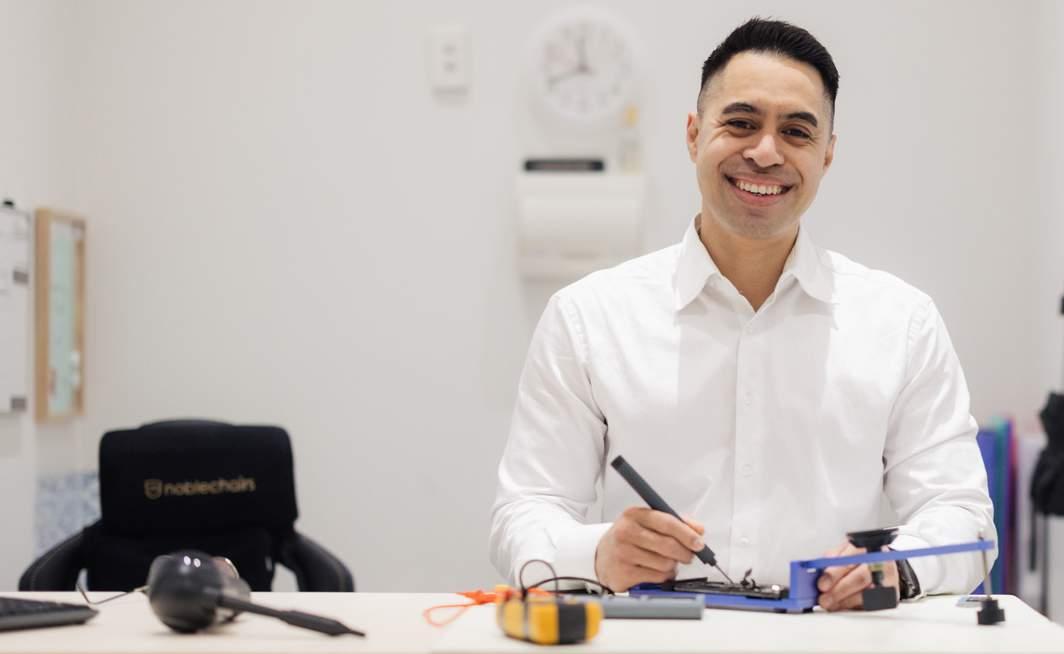
■ HE RECENTLY COMPLETED A DIPLOMA IN NETWORKING (LEVEL 6) THROUGH NEW ZEALAND SKILLS AND EDUCATION AND ALSO HAS A COMPUTER TECHNICIAN CERTIFICATE (LEVEL 5) AND HELP DESK SUPPORT CERTIFICATE (LEVEL 4)
■ MYLES RECOMMENDS STUDYING AT NEW ZEALAND SKILLS AND EDUCATION SAYING IT IS SPECIALISED, HAS A GOOD ATMOSPHERE AND THE STAFF GO ABOVE AND BEYOND
expanded the services to include motherboard repairs and upgrades for laptops, PCs, MacBooks, tablets and smartphones.”

Myles went to Papakura High School and although he enjoyed Science, Mathematics, Accounting, PE and English, he left at the end of Year 11 because he felt the lack of technology classes were limiting his growth. But he never let that deter him from pursuing his passion. Determined to succeed in the tech industry, he opted to study at private institutions and earned a computer technician certificate (Level 5) and help desk support certificate (Level 4) before his school friends even completed Year 13. And he has not stopped learning since.
For more information on studying technology through New Zealand Skills and Education, visit www.nzse.ac.nz
LEAVING SCHOOL ISSUE #27 | LEAVINGSCHOOL.CO.NZ
TECH ENTREPRENEUR 41
SHOP WITH YOUR EYES WIDE OPEN
DON’T GET TEMU-ED
Don’t “shop like a billionaire” if you’re not. Online shopping app Temu is all over social with its tempting prices and fancy adverts. Here’s why you shouldn’t let yourself get Temu-ed.
If you haven’t heard of it, Temu is a Chinese online shopping platform that launched in late 2022. The app has been downloaded more than 50 million times. Temu wants you to shop on its platform without giving a second thought to the cost. We all like cheap things and Temu in particular is bombarding us with cute items, lightning deals and free shipping offers, although some of the deals are duds or cheap knockoffs.
“Shop like a billionaire” the tagline says. It can be tempting. But whether you’re leaving school to start work or going to university, avoid being sucked into spending money unnecessarily. Yes, the prices are low. But do you really need this stuff? A dollar in your wallet is better than junk piling up.
BUT IT’S ONLY $1
Online shopping apps sell themselves as budget friendly and they’re often anything but. Temu wants you to think, ‘Why not? It’s only $1 or $5 or $10’. But a few bucks here and a few bucks there on stuff you don’t need, can soon add up to hundreds, if not thousands, of dollars a year.
The excitement of shopping on platforms like Temu, Wish, Aliexpress or Shein isn’t so great when you find you can’t pay your rent or bills, or you don’t have the money to do things with your friends. Maybe your friends are going to a festival or even overseas in the holidays and you have no money left.

If in doubt, go back and look at all your online and marketplace purchases from a year ago. Did you really need or use those purchases?
writer DIANA CLEMENT photo credit i STOCK
things that you never use. By not buying stuff, managing your money becomes a whole lot easier. You might even have money left over to save or you’ll come out of tertiary study with less debt. If you find yourself with a shopping cart full of items you don’t need then one of the easiest ways to get out of the habit of buying cheap junk is to remove the apps from your devices. Turn off notifications on Instagram and other social channels and stop following influencers who want you to buy things.
TRY A NO-SPEND MONTH
Do something radical for your finances – such as having no-spend months or choosing to buy from thrift stores. Try searching YouTube or TikTok for ‘things I don’t buy anymore’ and you’ll find influencers encouraging you not to buy, rather than vice versa. It’s surprising how many of Temu’s offerings that we think are needs turn out to be wants.
Of course, everyone does need to spoil themselves sometimes. If not, it’s impossible to stick to a budget. So always make sure you give yourself a fixed amount of fun money and spend time planning how to spend it.
It’s easy to leave tertiary study with debt twice the amount of your study costs if you don’t budget and watch every dollar like it owes you.
WHY NOT BUYING STUFF IS BETTER
The gentle art of ‘not buying stuff’ is a whole lot better for your finances than finding your flat full of
CLIMATE CHANGE AND FORCED LABOUR

If you’re still struggling to not buy stuff, then consider the environment and the workers. The world doesn’t need more and more plastic and disposable items. International governments have investigated reports that some goods for sale on Temu are linked to forced Uyghur labour.

FINANCIAL TIPS 42 LEAVINGSCHOOL.CO.NZ | LEAVING SCHOOL ISSUE #27
TRY SEARCHING YOUTUBE OR TIKTOK FOR ’things I DON’T buy anymore’ AND YOU’LL FIND INFLUENCERS ENCOURAGING YOU NOT TO buy , RATHER THAN VICE VERSA .
WHY YOUR VOTE IS IMPORTANT
USE YOUR VOICE – IT MATTERS
Are you leaving school and don’t think your vote will impact your future? Do you consider that your voice is not important in politics? Think again.
Election day is Saturday, 14 October and citizens or permanent residents of New Zealand aged 18 years or over on election day can and should use their voice by voting.
One good reason young people should vote in this year’s general election is that their lives and the expectations of what they should be doing has changed from when most politicians were young, says UN Youth New Zealand member and University of Auckland student Noor Randhawa (20).

“The experiences of the older generations don’t accurately represent the experience of youth today, now that we have social media, AI, blockchain etcetera.

“The effects of this election are going to be felt by us. We don’t want the short end of the stick when it comes time for us to reap the benefit just because we didn’t bother putting in the work early on,” Noor says.
“The youth of today are the citizens of tomorrow and [we] can’t leave the decisions for our future to be made up by the minds of those who won’t be around to suffer the consequences.”
Elections are your chance to choose the people and parties who make decisions on your behalf about how our country is run, says New Zealand’s Electoral Commission. By voting, you can have your say on the issues that affect you, your friends and your whānau.
“It is a fundamental flaw with our democracy that we don’t have enough young people accurately representing their experiences,” adds Noor. “Everyone in New Zealand is a part of a family or community [and] we all use public services, like education and health services. Decisions about those things – how they’re funded, how they work and how they’re accessed – are made by people you vote for in general elections.”
By voting, you are helping to choose the party and people that best suit your future. While election day is on 14 October, you can vote at any voting place in Aotearoa from 2 October.
To be eligible to enrol and vote, you need to turn 18 before 14 October this year and be either a New Zealand citizen or permanent resident. If you’re 17 now, you can still fill out an enrolment form and on your 18th birthday, the Electoral Commission’s team will automatically enrol you.
Enrolment can be done online at vote.nz using a New Zealand driver licence, New Zealand passport or your RealMe verified identity.





Voting is easy and it takes less than five minutes to do. When you vote, you will be given a ballot paper to fill out. Each voter has two votes – one for the party you support and one for the candidate you want to represent your local area. The party or parties with the biggest share of votes form the government, which decides on things like schools and hospitals. Not only do our young people’s votes count, but their voice matters.
Noor recommends young voters attend programmes and events to familiarise themselves with politics. “Programs like UN Youth are really good ways to get involved. They help facilitate the conversations for those who might not have a political background. One vote, although it is small, is the ripple that will help bring the wave of change.”
Keep an eye out for political events in your area to help familiarise yourself with the parties and your local politicians.
For more information about enrolling and voting in this year’s general election, visit www.vote.nz

LEAVING SCHOOL ISSUE #27 | LEAVINGSCHOOL.CO.NZ GENERAL ELECTION 43
THE EFFECTS OF THIS ELECTION ARE GOING TO BE FELT BY US. WE DON ’T want the short end of the stick WHEN it COMES TIME FOR US TO REAP THE BENEFIT JUST BECAUSE WE DIDN ’T BOTHER PUTTING IN THE WORK EARLY ON
NOOR RANDHAWA
writer MILO BROWN // image credit i STOCK
ORGANISE YOUR MONEY
MANAGE YOUR ACCOUNTS BETTER
Organising your bank accounts is a must-learn skill for students. It will save you heaps and hopefully help you pay your bills on time. Keeping all your money in one bank account makes it tempting to spend until it’s gone – never mind paying the rent or buying food.
There’s a savvy solution to this problem that eliminates some of the stress. That’s to open multiple accounts with the same bank for different purposes such as:
■ fixed expenses, like rent and phone.
■ variable expenses, like food and electricity.

■ short-term savings accounts for student fees and occasional expenses, like warrant of fitness and spending/fun money.

If your bank doesn’t let you open extra free online accounts, then ditch them and switch to one that does.
GETTING STARTED
Give your new accounts custom names such as ‘bills’, ‘supermarket’ or ‘fun’ and you will know, at a glance, what that money is for. When your StudyLink payments, wages or other money lands in your main account, split the money between your sub-accounts for different needs and wants.
That way you’re less likely to ‘accidentally’ spend money that’s meant for food, rent, utilities and other essentials. To make it work, you do need to be honest with yourself and not dip into other accounts.
MAKE A PLAN
If you have a budget, you’ll know exactly how much you need to put aside each week or on pay day into different categories such as food, clothes and transport. If not, make a list of essential spending and have that money credited to the relevant account at the beginning of the week, month or semester, depending on when you get paid or receive your StudyLink payments. Always make sure you have some money set aside for fun. To make the new system work, you need to automate it. Ask your bank if it can split your incoming money automatically. The other option is to set up multiple automatic payments from your main account to the others. If you can’t work out how, don’t hesitate to visit a branch or call your bank so that they can do the work for you.
SET UP TEXT ALERTS
It’s free with most banks to set up text or email alerts to avoid going overdrawn, which can incur unexpected fees. Alerts can tell you if an account balance falls below a certain level or if, for example, a regular automatic payment or direct debit fails.
PLANNING FOR FEES
It’s a good idea when organising your accounts to find a way to keep money earmarked for study fees away from your day-to-day bill and spending
writer DIANA CLEMENT photo credit i STOCK
IT ’S VERY EASY TO DIP INTO YOUR BILLS OR SAVINGS ACCOUNTS FOR REGULAR SPENDING .
TRY NOT TO
BILLS AND SAVINGS ACCOUNTS .
accounts. Check if your bank has an online savings account that pays interest.
DON’T BE TEMPTED
It’s very easy to dip into your bills or savings accounts for regular spending. Try not to be tempted. It can help if your debit card isn’t connected to rent, bills and savings accounts. Check with your bank if you can have accounts with additional EFTPOS cards. Don’t hesitate to ask – banks want your business.

CONSIDER USING DIGITAL APPS
Most young people opt for fee-free student or youth banking from the main banks. But there are new
electronic wallets and apps in New Zealand that can help with budgeting and money management. Revolut, for example, is a digital app with a debit card attached. The app has budgeting built in and helps you analyse spending.
The Dosh app allows customers to stash money in different wallets and to split bills with friends. Buck is another local bill-splitting app. Finally, if you do need to shop around for a better student account, visit MoneyHub’s guide at www.moneyhub.co.nz
LEAVINGSCHOOL.CO.NZ | LEAVING SCHOOL ISSUE #27
BE TEMPTED. it can help if your debit card ISN ’T CONNECTED TO RENT,
FINANCIAL TIPS 44
ACING THE INTERVIEW IMPRESSING YOUR FUTURE EMPLOYER

You’ve done the hard yards. You’ve got your secondary school qualifications, your CV is in order, you’ve applied for a job or placement with a training provider – and now you’ve secured an interview. But what is the person sitting opposite you looking for?
ATTITUDE
Have a good attitude and positive self-esteem. By showing respect for the interviewer, you are demonstrating you can work effectively with people from different backgrounds (e.g. age, social status, ethnicity, religion), which is a quality employers look for.
COMMUNICATION
Actively listen to what you are being asked, seek clarification if you are unsure, and then respond. Have a couple of questions you want to ask too – this shows you have taken the time to find out more about the organisation and thought about what you want from the interview. As always, treat the interviewer/s with respect and courtesy.
CULTURAL FIT
Think of how you can demonstrate how you will be an active and motivated member of their team. Employers rank cultural fit as their number one priority when they are recruiting – especially for school leavers or first-time employees.
PERSONAL SKILLS
Employers are looking for candidates who demonstrate willingness to learn, are motivated to get things done, take responsibility, and demonstrate ability to problem solve. Often you can link your extra-curricular activities
(sport, cultural or community) to demonstrate your personal strengths in these areas.
TECHNOLOGICAL SKILLS
It’s important to show you can use technology in the workplace to perform tasks necessary to the role you’ve applied for. This could be having the computer skills required to produce and present information, create spreadsheets and so forth.
RELIABILITY
You are responsible for getting yourself to and from work, whether that’s via public transport or your own vehicle.
It’s important to demonstrate you are capable of turning up on time and have prepared for the meeting. This is what employers expect from you on a day-to-day basis – so always arrive in plenty of time and ready for your interview.
ACADEMIC SKILLS

Your academic qualifications are important, so make sure these are included in your CV, and show how you have competent literacy and numeracy skills. If you’ve undertaken further training include this too. It is widely accepted that achieving NCEA Level 2 will mean you have the basic skills and qualifications to start your career.
WHILE NOT ESSENTIAL, IT IS HELPFUL IF YOU HAVE PREVIOUSLY HELD A HOLIDAY JOB
This gives the employer a peek into what you will be like as an employee – it’s not so much about what you were doing, but how you did it. For you, this work experience gives you an insight into what employers require, and the chance to develop key skills in a work setting. You may be able to use some of your experiences to highlight your positive qualities and attributes the interviewer is looking for. ALL THE BEST, AND ALWAYS GIVE IT YOUR BEST SHOT!
LEAVING SCHOOL ISSUE #27 | LEAVINGSCHOOL.CO.NZ
45 photo credit iSTOCK INTERVIEW TIPS 45
...WORK EXPERIENCE GIVES YOU AN INSIGHT INTO WHAT EMPLOYERS REQUIRE, AND THE CHANCE TO DEVELOP KEY SKILLS IN A WORK SETTING. YOU MAY BE ABLE TO USE SOME OF YOUR EXPERIENCES TO HIGHLIGHT YOUR POSITIVE QUALITIES AND ATTRIBUTES THE INTERVIEWER IS LOOKING FOR
A CLOSER LOOK AT SOME SOLID CAREER OPTIONS JOBS IN FOCUS
There are so many things to consider when looking at which path to take after school. Have a look at the following jobs and learn about the relevant factors for each position.
Here you’ll find profiles of nine jobs from across a variety of sectors. Each profile includes detailed job descriptors and some insightful statistics..
Also known as: Game artist/animator; game designer; game producer; game programmer; game tester.
Game developers create games for computers, gaming consoles, tablets and mobile phones. This involves writing, storyboarding, designing, programming, animating and testing.




GAME DEVELOPER Kaihanga tākaro
To become a game developer, it is essential to have experience with video games and computers. Specifically for game programmers, it is usually expected that candidates have a relevant degree, such as a Bachelor of Computer Science, Bachelor of Software Development or Bachelor of Engineering. Within these degrees, tertiary providers often have a specialised course in game programming or interaction design. For game artists or developers, a portfolio or showreel of games built is recommended. Further, a degree or diploma in 2D or 3D animation, media design or game art and development is often preferred by employers.
Useful NCEA subjects for game programmers are Maths, Physics and Digital Technologies. Useful NCEA subjects for game artists are Design and Visual Communication (Graphics), Art History and Visual Arts.
Chances of getting a job as a game developer are poor for those wanting to enter the role, but are good for those with experience.
Statistics: Job prospects: Poor. Length of study: 2–3 years.
Pay scale: Junior game developers with up to three years’ experience usually earn between $60,000–$80,000 per year. Intermediate game developers with three to seven years’ experience uusually earn between $80,000–$100,000 per year. Senior game developers with more than seven years’ experience can earn over $100,000 per year.
Also known as: Digital artist; visual effects artist; web animator; 2D animator; 3D animator; illustrator. Animators create still and moving images using software, models, photography and drawings. Their creations are used in advertisements, film, print (such as books and magazines), online or on television.
ANIMATOR
Kaiwhakahauora
To work as an animator, it is necessary to have a portfolio or showcase of your work. Employers generally look for experience (in a particular type of animation or a particular piece of software) and/or tertiary qualifications, such as a Bachelor of Creative Media Production, a Bachelor of Design majoring in Visual Communication Design or a Diploma in Animation.
Useful NECA subjects in this role include Design and Visual Communication (Graphics), Design (Practical Art), Digital Technologies, Art History, Maths, te reo Māori and Painting, Sculpture, Photography, Printmaking Combined. Chances of getting a job as an animator are average for those wanting to enter the role, but are good for those with experience.
Statistics: Job prospects: Average.
Length of study: 3 years.



Pay scale: Graduate animators usually earn minimum wage.
2D animators usually earn between $23–$70 per hour. 3D animators usually earn between $23–$100 per hour.
Also known as: Commercial interior designer; residential interior designer; design consultant. Interior designers plan, design, decorate and furnish spaces across a range of settings, including residential, commercial, retail and leisure. They work with clients and work to their requirements. Interior designers may also work alongside architects, tradespeople and other contractors to deliver on projects.
While there are no specific eligibility requirements to work as an interior designer, employers usually prefer candidates to have a Bachelor of Interior Architecture, Bachelor of Interior Design, Bachelor of Industrial Design or Bachelor of Spatial Design.
Useful NCEA subjects in this role include Art History, Design and Visual Communication (Graphics), Maths, Physics and Painting, Sculpture, Photography, Printmaking Combined.
Chances of getting a job as an interior designer are average as a stable number of people are in this role. The occupation is small in number and there is high competition for job vacancies.
Statistics: Job prospects: Average. Length of study: 3 years.
Pay scale: Interior designers with up to seven years’ experiences usually earn between $55,000–$95,000 per year.
Senior interior designers with more than seven years’ experience usually earn between $90,000–$120,000 per year.
Also known as: Marine architect; yacht designer; boat designer; marine designer.
NAVAL ARCHITECT
Kaitātari pakihi
Naval architects plan, design and supervise the construction and repair of ships, yachts and boats. In this role, naval architects consult with clients, professionals and government officials on designs, check for compliance with safety regulations, write reports and conduct computer simulations and physical tests.
To become a naval architect, it is necessary to have a Bachelor of Engineering (Honours) majoring in Maritime Engineering (Level 8). This degree is through Auckland University of Technology (AUT) and is delivered in partnership with the Australian Maritime College in Tasmania. It is possible to specialise in marine and offshore engineering, naval architecture and ocean engineering.
Useful NCEA subjects in this role include Construction and Mechanical Technologies, Design and Visual Communication (Graphics), Digital Technologies, Maths and Physics.
Chances of getting a job as a naval architect are good due to demand for their services.
Statistics: Job prospects: Good. Length of study: 4 years.
Pay scale: Graduate naval architects usually earn $62,000–$78,000 per year.
Naval Architects with three to six years’ experience usually earn $85,000–$110,000 per year.
Naval Architects with more than six years’ experience can earn $150,000 per year or more.
LEAVINGSCHOOL.CO.NZ | LEAVING SCHOOL ISSUE #27
JOB PROSPECTS POOR AVERAGE GOOD
LENGTH OF STUDY LENGTH OF STUDY INTERIOR DESIGNER Kaitātai o-Roto
INCOME LOW MEDIUM HIGH JOBS IN FOCUS 46 The job data was sourced from CAREERS NEW ZEALAND, visit www.careers.govt.nz
JOB PROSPECTS POOR AVERAGE GOOD INCOME LOW MEDIUM HIGH JOB PROSPECTS POOR AVERAGE GOOD LENGTH OF STUDY STUDY INCOME LOW MEDIUM HIGH JOB PROSPECTS POOR AVERAGE GOOD LENGTH OF STUDY LENGTH OF STUDY INCOME LOW MEDIUM HIGH LENGTH OF STUDY Please note: The occupations listed have been colour coded to their predominant service industry sector colours using the Vocational Pathway colour chart
SALES OR MARKETING MANAGER Kaiwhakahaere hokohoko
Also known as: Regional sales manager; digital marketing manager; marketing communications manager; national sales manager. Sales or marketing managers plan, organise and lead the development, promotion and sale of a company’s products, goods and services. In this role, a sales or marketing manager may write reports, analyse markets, help to develop new products and services, manage marketing and sales staff, and identify new markets.
To become a sales or marketing manager, it is generally expected that candidates have a degree in marketing, business, economics, commerce or a related field. Relevant experience in sales or marketing is also a requirement.
Useful NCEA subjects in this role include Business Studies, Design and Visual Communication (Graphics), Media Studies and English. Chances of getting a job as a sales or marketing manager are good as there is strong demand for their services. Enhance your chances of securing a job by developing strong digital sales and marketing skills, such as knowledge of search engine optimisation, e-commerce and social media management.
Statistics: Job prospects: Good.
Length of study: 3 years.
Pay scale: Sales managers usually earn $100,000–$200,000 per year. Marketing managers usually earn $96,000–$230,000 per year.
Curators plan and organise exhibitions, including their content and quality, as well as work on repatriation projects. In this role, a curator may also research, write and present about certain collections or exhibits. Liaising with artists, dealers, museums and galleries on collections and deciding what to add to their workplace’s gallery or museum is also another aspect of this role.
CURATOR Kaitiaki taonga
To become a curator, it is necessary to have considerable industry experience in a relevant area, such as art, art history, Māori or Pacific studies, science, anthropology and history. A postgraduate degree in such a specialist area or a postgraduate qualification in museum studies may also be useful.
Useful NCEA subjects in this role include te reo Māori, Pacific Studies, Art History, History, Classical Studies, Science, Construction and Mechanical Technologies, English and Painting, Sculpture, Photography, Printmaking Combined. Chances of getting a job as a curator are poor as it is a small occupation with limited vacancies and few fulltime roles available. Curators tend to stay in the role for a long period of time, which also limits vacancies.
Statistics: Job prospects: Poor.
Length of study: 5 years.
Pay scale: Curators at smaller museums or galleries usually earn $55,000–$65,000 per year. Experienced curators at larger museums usually earn $65,000–$70,000 per year. Senior curators or team leaders with five years’ experience or more usually earn $70,000–$95,000 per year.
Also known as: Photojournalist; medical photographer; wedding, portrait and commercial photographer. Photographers take photographs of people, products, events or places using digital or film cameras and lighting equipment. Photographers come up with ideas for photoshoots and then plan and organise these. On the day, they arrange models, products, lighting, props and cameras. Afterward, they digitally edit and process the images for print or online use. They may also plan, produce and edit video footage. Most photographers gain skills on-the-job. While there are no specific entry requirements to become a photographer, a relevant tertiary qualification, such as a Bachelor of Fine Arts, may be useful.
Useful NCEA subjects in this role include Visual Arts, Design and Visual Communication (Graphics), Digital Technologies and Art History. Chances of getting a job as a photographer are average for those newly entering the industry, but good for those with experience.
Statistics: Job prospects: Average.
Length of study: Varies.
Pay scale: Photographers in training usually earn minimum wage. Photographers with two to three years’ experience usually earn $25–$35 per hour. Self-employed photographers can earn $50–$250 per hour.
ADVERTISING SPECIALIST

Also known as: Advertising account manager; advertising art director; advertising account executive; media planner; media buyer; producer. Advertising specialists design, plan, organise and implement advertising campaigns to sell products or services for clients. This includes briefing various teams, developing creative concepts, preparing budgets, monitoring progress and reporting back to the client. They also ensure that work is completed on time and on budget.
While there are no specific entry requirements to work as an advertising specialist, many employers prefer to hire advertising specialists who have a degree or diploma in a relevant area, such as advertising, marketing, sales, communications, graphic design or media studies.
Useful NCEA subjects in this role include English, Design and Visual Communication (Graphics), Media Studies and Business Studies. Chances of getting a job as an advertising specialist are average due to high competition for limited vacancies and a moderate staff turnover rate.
Statistics: Job prospects: Average.
Length of study: Varies.

Pay scale: Advertising executives usually earn $47,000–$55,000 per year. Account managers usually earn $55,000–$100,000 per year. Media buyers usually earn $50,000–$120,000 per year. Media planners usually earn $65,000–$100,000 per year. Advertising art directors usually earn $65,000–$120,000 per year.
Also known as: Goldsmith; manufacturing jeweller; silversmith; contemporary jeweller. Jewellers design, make, alter and repair jewellery, such as rings, bracelets, necklaces and earrings. They may design freehand or use computer-aided design tools. Other tasks in this role include selecting gems and metals, filing and polishing jewellery, estimating the value of pieces and selling pieces of jewellery.
To become a qualified manufacturing jeweller, it is necessary to complete an apprenticeship and gain a New Zealand Certificate in Manufacturing Jewellery (Level 4). The entity that oversees manufacturing jeweller apprenticeships is the Jewellery Industry Registration Board of New Zealand.
To work as a contemporary jewellery, there is no industry-certified training that is required.
Useful NCEA subjects in this role include Design and Visual Communication (Graphics), Maths and Painting, Sculpture, Photography, Printmaking Combined.
Chances of getting a job as a jeweller are poor for those wanting to enter the role, but good for those with experience. There is strong competition for a limited number of positions.
Statistics: Job prospects: Average. Length of study: 4 years.
Pay scale: Manufacturing jewellery apprentices usually earn minimum wage. Qualified manufacturing jewellers usually earn up to $60,000 per year. Experienced manufacturing jewellers with five years’ experience or more usually earn up to $100,000 per year. Pay for contemporary jewellers varies widely, depending on success and marketability.





47 JOBS IN FOCUS LEAVING SCHOOL ISSUE #27 | LEAVINGSCHOOL.CO.NZ
Ngaio pānui toko PHOTOGRAPHER Kaitango whakaahua
LENGTH OF STUDY STUDY JOB PROSPECTS POOR AVERAGE GOOD INCOME LOW MEDIUM HIGH JOB PROSPECTS POOR AVERAGE GOOD LENGTH OF STUDY INCOME LOW MEDIUM HIGH INCOME LOW MEDIUM HIGH INCOME LOW MEDIUM HIGH JOB PROSPECTS POOR AVERAGE GOOD JOB PROSPECTS POOR AVERAGE GOOD JOB PROSPECTS POOR AVERAGE GOOD LENGTH OF STUDY VARIES LENGTH OF STUDY VARIES INCOME LOW MEDIUM HIGH LENGTH OF STUDY JEWELLER Kaihanga taonga rei
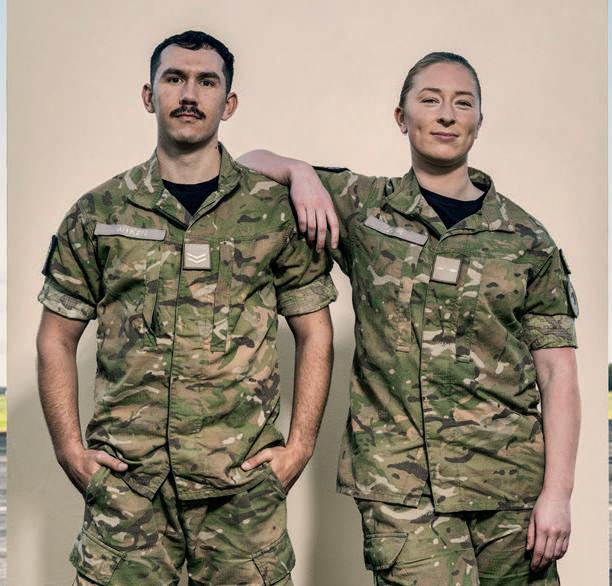






































































































































































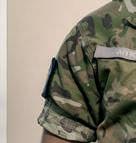

















SEE THE STORY SEE THE STORY SEE THE STORY

























































 writer PETER WHITE photographer LOGAN WEST
writer PETER WHITE photographer LOGAN WEST















































 writer PETER WHITE photographer LOGAN WEST
writer PETER WHITE photographer LOGAN WEST


































































































































































































































































































































































